#roger does theatre
Explore tagged Tumblr posts
Text
And to close out a very special Wednesday some first row audience Evans from the OT IG story




#shaun evans#churchill in moscow#Evans in the theatre but not on stage for once#front row evans#that’s quite the man spread going on there#hot damn evans#roger allam#roger does theatre#the wednesday special#with no nakedness and 5000 layers#although at least he isn't wearing that gilet actually in the theatre
32 notes
·
View notes
Text
Voice actors are NOT the same as actors.
It takes a specific kind of skill-set and training to be able to warp and meld the voice. It takes a certain kind of talent and dedication to hone that talent into the ability to meld the voice and invoke emotion with one's voice alone. Actors are used to using their voice secondarily to their body language and their facial expressions. It's all mirrored back on camera. They do have nuance. But it's a different kind of nuance and a different kind of training to produce that nuance.
Voice actors might get their likeness transposed on their character's design, and maybe their mannerisms might seep into the character's animation. But when it's all said and done: their presence is in their voice. They are bringing a character to life, showing that emotion in their voice, trying to keep a specific accent, drawl, pitch, tone in that voice and keep it consistent for their recording sessions.
The voice actor is like a classically trained musician who can play first chair in a competitive, world-renown orchestra. The actor (who fills the voice actor's role) is like a moot who played violin in beginner and intermediate high school orchestra and thinks they can get into Juilliard with that 2-4 years of experience.
This doesn't mean that the HS orchestra moot can't play. They can even be really good at it. Maybe they won competitions and sat first chair. But they are not in the same league as the person who's been training their whole lives and lives and breathes to hone their craft using the instrument and all of the training they've ever acquired to perfect it. They are not meant for the same roles. They are not in the same caliber. You do not hire the HS equivalent when you want to play complex music in a competitive orchestra.
Actors are not the same as voice actors.
And furthermore, actors - especially big name actors - taking the roles of animated characters for big budget films or TV pilots makes no sense anyways when - at least in the case of TV pilots - there's not a point to hiring a big budget actors anyways. That money could be used elsewhere (like paying your animators), and the talent that is brought onto the screen for X character could then be hired on to voice said character no recasting required.
I wouldn't say voice acting as a profession is in danger exactly, but it's certainly being disrespected and overlooked for celebrity clout, and this has ALWAYS been an issue. Shoot, even Robin Williams knew that much - which is why he tried so hard not to be used as a marketing chess piece for Aladdin and got royally pissed off when it happened anyways. People shouldn't go to any movie (but especially not animated films) because "oh famous actor is in it". People should go because it's a good movie and the voice acting is good.
People who honest to god think that voice actors are replaceable because "oh well anyone can voice act" or "I like xyz celebrity so naturally it'll be good" ... Honestly I just wish you'd reassess your priorities because you're missing the point and are part of the problem.
Voice Actors ≠ Actors.
#(i am incredibly passionate about this)#(and seeing celebrity voice actors in what should be a voice actor's role completely burns my buns it doesn't matter WHO it is)#(hemsworth as optimus? someone tell me one good reason why they couldn't get a good v/a to replace mr. cullen properly for the future)#(ben shwartz as sonic? dude literally isn't even a good voice actor OR actor anyways-)#(- A N D jason griffith AND my boy roger craig smith are still RIGHT HERE)#(jason griffith IN PARTICULAR would have pulled back SO many sonic fans that went to watch the film anyways. if not /more/.)#(and on top of that he has the same tonality and energy they tried to force this moshmo to try and emulate anyways so GET THE REAL THING)#(chris pratt as mario? i can at least defend /him/ and say that barring his failure to do a NY accent consistently he wasn't terrible)#(but mario's new voice actor could've been used instead and people would've clearly appreciated that WAY more)#(vanessa hudgens as sunny starscout in mlp g5's pilot movie? literally why. they replace her and hitch's va in the show.)#(don't even get me started on the concept of hiring celebrity singers to do musical theatre roles or not letting musical theatre singers-)#(-dub the celebrity voice actors you just HAD to hire for your film bc you're so worried about not getting enough clout to get ppl in seats#(that you're putting it all in this (1) big name hire bc turns out that you have no faith in your writing ability much less-)#(-animation as a medium.)#(and no before anyone says anything : no this is not me saying that ALL celebrity voice castings are bad.)#(there are some that aren't that bad and others that are actually pretty good.)#(i especially appreciate it when actors are damn well aware they aren't voice actors and try to LEARN from voice coaches-)#(-and/or their va predecessors if applicable.)#(that does not change the fact that the celebrity shouldn't have been hired just because the film wanted to have bragging clout-)#(-oh look at this FAMOUS PERSON we were able to hire — yeah ok. sure wendy. i want to know if this film is quality or not.)#(and 9/10 times the SECOND there is money spent on a non voice actor to voice the main character especially)#(that usually means somewhere along the way animation IS going to get shafted. if not w the animators themselves then in the way of-)#(-the actual animation itself and ESPECIALLY the screenwriting because it's especially been so dogshit lately even before the strike.)#(a celebrity being hired to fill a voice actor's role is such an immediate red flag to me and it is VERY rare that i get to be proven wrong
120 notes
·
View notes
Text
just remembered the scene in house of cards (1990) where roger o’neill is collapsed whiskey-soaked in an armchair, rambling in tears about how his girlfriend has left him, he’s more addicted to drugs than he’s ever been, and everything is falling apart, et cetera. and then francis urquhart, who has been sat in a dark corner watching all this in impassive silence for ten minutes, starts quoting fucking macbeth at him. ‘if you can look into the seeds of time, and say which grain will grow and which will not….’ and roger goes ‘what?’ ‘nothing.’ hysterical. no reason for it. and then francis puts rat poison in his cocaine and makes him drive drunk down the motorway
#i love political drama. and i love you francis urquhart#house of cards#shoutout also to when he sends an mp’s wife a tape of said mp having sex with roger’s girlfriend at a conference and then rings them up to#leave a bitchy little ‘you’ll have to shelve your leadership ambitions then eh’ message but he does it in an extremely silly bad scottish#accent. à la theatre of blood (1973) ‘i think mr sultry’s murdering his wife!!’
22 notes
·
View notes
Text
a really lousy day in the universe

roger & lisa/the homeless lady (based on revival version because they were the easiest to find good quality references of)
#a new brain#roger delli bovi#lisa doesn't have a canon last name does she. how should I tag her#a new brain homeless lady#a new brain lisa#anb lisa#musical theatre#william finn#my art <3
11 notes
·
View notes
Text

Moulin Rouge Hotel & Casino
May 1955, opening week. Photo by Loomis Dean.
Photos of Moulin Rouge
Timeline.
'54: Mar. 29, Las Vegas City Commission approves construction of Moulin Rouge. The project was launched by partners including New York restaurateur Louis Rubin, Beverly Hills developers Alexander & Henry Bisno (Bisno & Bisno co.), and smaller investors.
'54: Jul. 16, Groundbreaking.
'55: Apr. 6, Fire destroys the "motel wing" (Montmartre Motel) during construction. The fire does not delay the main hotel.
'55: May 24, MR preview opening, and debut Tropi-Can-Can show in the Cafe Rouge Theatre Restaurant; public opening follows on May 26. Owners, the Moulin Rouge Associates, include the Bisnos and Rubin among a group of over 20. Possible other owners include Joe Louis (2%), Joe West, Aron Blum, Edna Shulman, and Mark Lipsky. African-American staff include Joe Louis, host; Sonny Boswell, former Harlem Globetrotters, general manager; Jimmy Gay of Las Vegas, personnel director. MR's "late show" plays nightly starting on opening night. The hotel portion of MR was not fully completed at the time of opening. (RJ 5/24/55, RJ 5/27/55)
'55: Jun. 1, first known lawsuit against MR from contractor, Lawrence Hawthorne. (RJ 6/1/55)
'55: Oct. 5, City of Las Vegas threatens MR license unless finances and owners are disclosed.
'55: Oct. 10, MR closes. It is the first major Las Vegas hotel to close, immediately following legal action taken by Bartenders Union Local 165 and Culinary 226 over unpaid wages.
'55: Oct. 19, MR files petition for bankruptcy. A report from proceedings in Jan. '56 says, "Some 300 creditors have $850,000 in claims now pending. Among them, 185 local creditors including engineers, plumbers, electricians [and] employees..." (RJ 1/16/56)
'56: Jan., Montmartre Motel (adjoining the hotel) is open. Whether the motel, operated by Albert Childs, was open prior is unclear. The MR attraction board was moved from the front of the hotel, slightly west to the front of the motel.
'56: Nov. 27, Bankruptcy sale. Lone bid of $470,000 rejected.
'58: Nov., Leo Frey (Leroy Investment Co.) awarded the hotel by court. Frey, “a sizeable investor in the original corporation which owned the hotel and the partnership which operated it” (RJ 11/25/58). Frey is denied gaming license, reopens hotel and coffee shop. Other individuals later denied gaming license “because of unsuitable backgrounds of the landlords Leo, Herbert, and Karl Frey” (RJ 3/21/69).
'85: Joe & Sarann Preddy, and Joe Walker lease Club Rouge and the bar.
'90: Preddy & Walker group takes over ownership from Leroy Co., secures liquor and gaming license.
'92: Moulin Rouge listed on National Register of Historic Places.
'97: Sold to Bart Maybie.
'03: May 29, Fire destroys the showroom & casino building.
'04: Moulin Rouge Development Corp. buys property.
'08: MRD Corp. files for bankruptcy.
'09: Olympic Coast Investment takes ownership; May 6, Fire destroys the front hotel wing; Sign donated and moved to Neon Museum; tower demolished in 2010.
'12: OCI files bankruptcy.
'17: Fire; last remains of MR and Mo'Mart Motel demolished.
Entertainment.
Tropi-Can-Can was the Moulin Rouge's debut revue, running seven weeks. Las Vegas resorts usually had two shows per evening, or a third late show on weekends. Tropi-Can-Can included a late show every night, 8 PM, 11 PM and 2 AM. The revue in May 1955 included Benny Carter orchestra, Stump and Stumpy, The Platters (Reed, Lynch, Williams, Robi, Taylor), Timmie Rogers, Margie McGlory, Teddy Hale, The Honey-Tones, Ann Weldon, Bob Bailey as master of ceremonies, and the dancers (numbering 20 to 27, sources vary) including Delcenia Boyd (16 years old), Norma Tolbert, Dee Dee Jasmin, Mary Louise Randolph, Carrie Ann Pollard, and Anna Bailey (28 y/o). The Platters recorded their hit version of "Only You" a month before the opening of Moulin Rouge, and the record was released summer '55.
Hot, Brown & Beige was the second show for three weeks, featuring Stump and Stumpy, singer Toni Harper, dancers Maurice and Gregory Hines (ages 11 and 9), vocal and dance group The Double-Daters, doo-wop group The Flamingos.
The Lionel Hampton International All-Star Revue ran for another three weeks.

Construction, '54. Las Vegas News Bureau, LVCVA Archive.

Moulin Rouge Show Girls Arrive in Vegas. Review-Journal, 5/9/55.

5/23/55 – Jay Florian Mitchell Photo Collection, Nevada State Museum.

Photo by Las Vegas News Bureau, LVCVA Archive.
Sources include: City to Hear Both Sides. Review-Journal, 7/6/54 p2; Vegas' Newest Hotel Moulin Rouge Opens. Review-Journal, 5/25/55 p3; Capacity Crowd. Review-Journal, 5/27/55 p1; City Threatens Moulin Rouge License Over Ownership Fuss. Review-Journal, 10/5/55; Another Suit Against Spa. Review-Journal, 10/7/55 p3; Moulin Rouge Re-Financing Sought After Casino is Closed. Review-Journal, 10/11/55; No Action Against Spa Licenses. Review-Journal, 10/20/55; Businessmen Watching Events at Moulin Rouge. Review-Journal, 1/16/56; Couple trades parcel of land to get Moulin Rouge Hotel. Review Journal, 1/26/90; Earnest N. Bracey. Winter ‘96. The Moulin Rouge Mystique: Blacks and Equal Rights in Las Vegas, Nevada Historical Society Quarterly, Vol. 39, No. 4, p. 272-288; Nicole Raz. Light Touch Needed. Review Journal, 8/7/2016; An Interview with Katherine M. Joseph (OH-00979), Mary Louise Williams oral history interview (OH-01991), and Anna Bailey oral history interview (OH-00096), UNLV Special Collections & Archives; William H. “Bob” Bailey. Looking Up: Finding My Voice in Las Vegas (2009).
110 notes
·
View notes
Text
Also don't think anyone has said this (thats a joke) but like, art styles aside:
The animation, expressions, movement, everything of ATSV is IMPECCABLE.
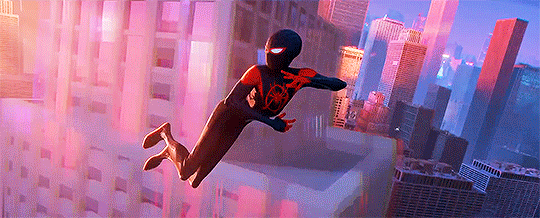
Like insanely, ridiculously, almost mind bogglingly good.
[This is a MEDIUM length post]
The main strength is the Emotion -
In terms of animation, the range of emotions Miguel is capable of expressing is like... crazy good. Gwen's emotions ARE UNSPEAKABLY IMPRESSIVE.
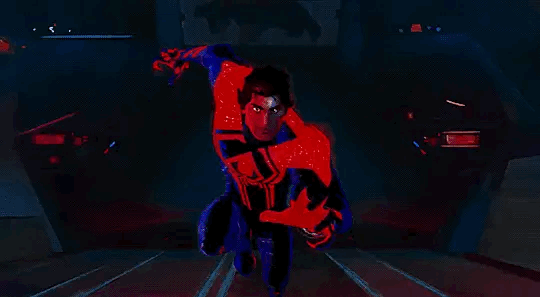
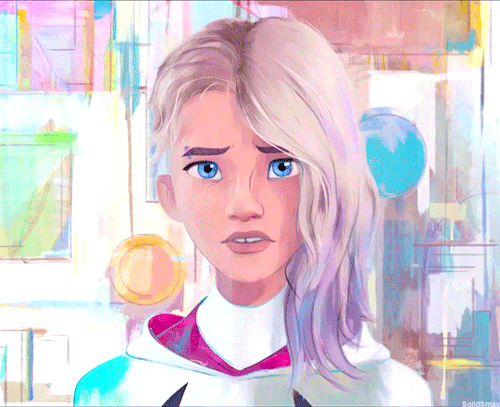
LIKE...ANIMATING HER FUCKING BREATHING???? AND BLINKS!! AS AN EMOTIONAL CUE. HELLO???!!
And the movie hinges on this - almost every scene has an emotional cue that HAS to hit. Whether is Jess's looks of hesitation or Peter B.'s looks of horror.
And this may seem like the most ridiculous comparison ever made but like...
The Bee Movie and Across the Spider-Verse came out FIFTEEN YEARS APART.

THE BEE MOVIE...THIS MONSTRASITY that has plagued humankind - was made less than two decades from THIS:


The fact that we progressed that far as a society (pun intended) in that short of a time will never not baffle me.
I genuinely cannot name any other animated movie that:
Has multiple styles throughout the duration
Can seamlessly change styles without the viewer immediately noticing (like Gwen returning to her universe)
Show two or more animation styles on screen at the same time (and no, Roger Rabbit and Space Jam don't count - that's half live action lol)
Just off the top of my head - ATSV shows up to three styles in one scene: I'm mainly thinking of the scene that shows Hobie (customized - style 1), Peter B. (standard - style 2), and Miguel (a light stylized - style 3).
It can be brought to four if you want to count Miles/Gwen, though their style isn't visible.
I can think of a couple scenes that genuinely blew me away in terms of animation -
One being Rio's 'What-EVER?!' because of the little stance correction and head bob she does, because it's such a natural thing to do. And it adds so much to an already perfect line.
It's something someone would genuinely do IRL without even noticing.
Another I LOVE is Pavitr and Hobie roughhousing.
Like, I can't yell about these five seconds of animation more.
It's SO fluid it looks like Motion-Capture and I left the theatre googling is any Mo-Cap was used in the movie (and from what I can tell - no, it's all original animation).
The way Pavitr falls to the side and bumps them - This not only being a natural reaction to Hobie and his weight, but it also LOOKS natural. So much so you can see it affect Hobie's model too. The movement has kinetic energy on both models -
Which is AMAZING CONSIDERING THEY'RE ANIMATED ON LIKE FOUR DIFFERENT TIMES.

In this shot alone, there's the guitar, vest, AND Hobie, all of which have their own animation rules. Plus the outline on his guitar AND him. And then there PAVI too, who's running at a higher frame rate, touching and interacting with Hobie.
So much so that Hobie's model nearly wraps himself around Pavi. Pavi's hair is moving, Hobie's guitar is moving, there's movement in the background - and it looks GREAT.
PLUS THE CAMERA IS MOVING AND GOSTLING. IT'S NOT A STATIC SHOT. The models and camera are moving AS IF THEY'RE REAL when they're not.
That's - My..I CAN EVEN COMPUTE THAT.
But by far, I think the range of expression used on Miguel is like... Chef's kiss.
(of course I was gonna trick you into reading another post about Miguel. Uh-huh that's what's about to happen)




Like... are you kidding me?
NAH DEADASS ARE YOU KIDDING ME?????
The whole later half of the movie hinges on Miguel looking buckwild crazy insane and they NAIL that. And like-

Oh my god what the actual fuck
?????????????????????????? I........ I have nothing to add. After that picture......Nah... LMAOOO


(left: actual photo of Moche watching this happen)
But Anyway chile, This movie is like.. genuinely a modern marvel.
If Marvel gave Tim Gunn 4 billion dollars and five years, whatever live-action rendition he would have made would not even compare to ATSV on any conceivable level - that's how good it is so jot that down.
And like...don't even get me started on Hobie..his design..his representation...girl I will start crying in this Arby's do not play with me
I just felt that needed to be said.
you get what I'm saying yall know what I mean iight coo
Here's a picture of Hobie to cleanse your palette.

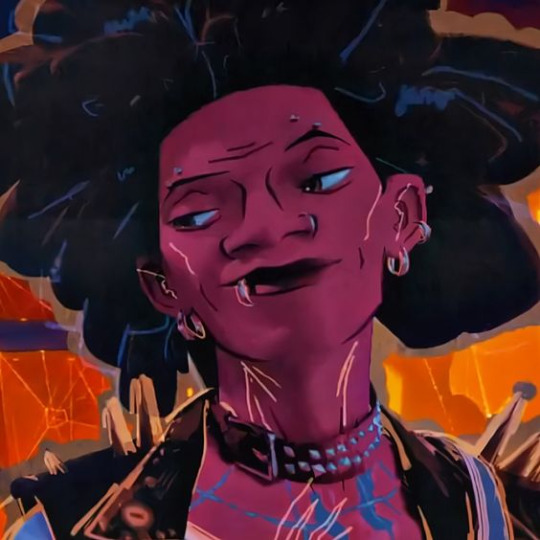
Bye.
#spiderman#atsv#spider man#marvel#hobie brown#across the spiderverse#spider punk#spiderpunk#gwen stacy#miguel ohara#miguel o'hara#miguel o hara#pavitr prabhakar#pavitr#pavi#astv#across the spider verse#miles morales#spiderman 2099#spiderman atsv
775 notes
·
View notes
Text
fOMAINH AT THE MOUTH BRYCE'S ACTING IS SO FUCKING GOOD AKAHSVDJEKEDBDB rewatching cinderellas castle for like the fourth time i haven't been counting and it's so amazing how despite knowing whats coming seeing her scream and cry when her stepmother shoots her friends AUUUGFHHH she does it SO GOOD i nearly broke into tears just watching her suffering she goes SO HARD AAAAAAAA
ok i know i already made a post screaming how much i love cinderellas castle but i REALLY REALLLY DO i can't even particularly say why but something about it i just love so much .... maybe it's just as simple as it being a dark fairytale and i've always loved those like cinderella was never especially my favourite princess tale ok well i like roger and hammersteins cinderella as well as ella enchanted and i think another one called ever after ans the disney version is fine and i like the third direct to dvd sequel but yknow um i like other fairytales better on a small level it kinda makes me feel like a little kid again excited to get lost in a tale of hopes and dreams and tragedy and magic and princesses and castles and wondering how it might ever after happily ....
i would understand if some people dislike it because it's too slow but i don't mind at all i am completely enraptured and hardly notice the time ... i just wanna mention how i love the power of theatre it's so easy to suspend your disbeliefs and see the world the actors pantomime like in the carriage when we first see tadius and the prince - curt and james are just sitting on a bench but i can so easily see the inside of a royal carriage , i can see that window the prince rolls down and him sticking his head out the window i can so perfectly see the glass he drags his finger across - i can see ella drenched in a river marvelling at her clean skin with the water still dripping from her arms i can see the ruined ashmore house covered in muck and grime i can see the mystical woods with its abundance of lush green plants need i go on it's so incredible how theatre has the power to do that ....
ok i need to go resume it it's been long enough i aaaaa i love cinderellas castle i love starkid i love theatre <3
#starkid#team starkid#cinderella's castle#cinderellas castle#cc spoilers#ella ashmore#bryce charles#g.l.e.e. mission logs
33 notes
·
View notes
Text
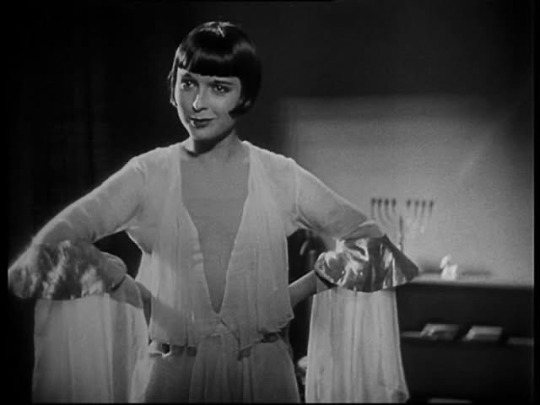
At the age of fifteen, Louise Brooks began her career as a dancer and toured with the Denishawn School of Dancing and Related Arts. After being fired, she found employment as a chorus girl in "George White's Scandals" and as a semi-nude dancer in the Ziegfeld Follies in New York City. While dancing in the Follies, Brooks came to the attention of Walter Wanger, a producer at Paramount Pictures, and was signed to a five-year contract with the studio.
Dissatisfied with her mediocre roles in Hollywood films, Brooks went to Germany in 1929 and starred in three feature films which launched her to international stardom: "Pandora's Box" (1929), "Diary of a Lost Girl" (1929), and "Miss Europe" (1930); the first two were directed by G. W. Pabst.
Brooks recalled that "when we made 'Pandora's Box', Mr. Pabst was a man of 43 who astonished me with his knowledge on practically any subject. I, who astonished him because I knew practically nothing on every subject, celebrated my twenty-second birthday with a beer party on a London street."
Brooks claimed her experience shooting "Pandora's Box" in Germany was a pleasant one: "In Hollywood, I was a pretty flibbertigibbet whose charm for the executive department decreased with every increase in my fan mail. In Berlin I stepped to the station platform to meet Mr. Pabst and became an actress. And his attitude was the pattern for all. Nobody offered me humorous or instructive comments on my acting. Everywhere I was treated with a kind of decency and respect unknown to me in Hollywood. It was just as if Mr. Pabst had sat in on my whole life and career and knew exactly where I needed assurance and protection."
When audiences and critics first viewed Brooks' German films, they were bewildered by her naturalistic acting style. Viewers purportedly exited the theater vocally complaining, "She doesn't act! She does nothing!" In the late 1920s, cinemagoers were habituated to theatre-style stage acting with exaggerated body language and facial expressions. Yet Brooks' acting style was deliberately subtle as she knew the close-up images of the actors' bodies and faces made such exaggerations unnecessary. When explaining her acting method, Brooks posited that acting "does not consist of descriptive movement of face and body but in the movements of thought and soul transmitted in a kind of intense isolation." This innovative style continues to be used today by film actors but, at the time, it was surprising to viewers who assumed she wasn't acting at all.
Film critic Roger Ebert later noted that, by employing this acting method, "Brooks became one of the most modern and effective of actors, projecting a presence that could be startling."
The result of her appearances in the two films by Pabst was that Brooks' became an international star. According to the film critic and historian Molly Haskell, the films "expos[ed] her animal sensuality and turn[ed] her into one of the most erotic figures on the screen—the bold, black-helmeted young girl who, with only a shy grin to acknowledge her 'fall,' became a prostitute in 'Diary of a Lost Girl' and who, with no more sense of sin than a baby, drives men out of their minds in 'Pandora's Box'."
Brooks is regarded today as a Jazz Age icon and as a flapper sex symbol due to her bob hairstyle that she helped popularize during the prime of her career. (Wikipedia)
Happy Birthday, Louise Brooks!
31 notes
·
View notes
Text
Henry Winkler Vs. Wayne Rogers

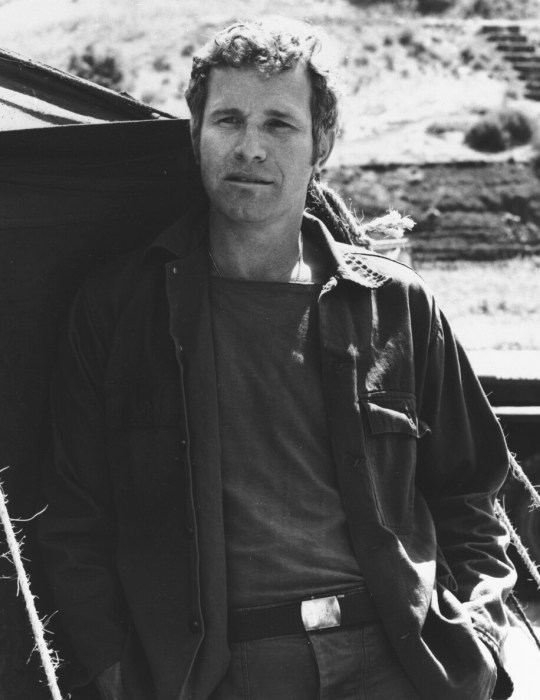
Propaganda
Henry Winkler - (Happy Days) - The Fonz created cool. He’s a greaser with a heart of gold; a totally swoon worthy bad boy. And he’s a talented mechanic - I wish I could fix all appliances the way he does.
Wayne Rogers - (M*A*S*H, Stagecoach West, City of Angels) - "He just had this warmth and gentleness to him that made him sooo attractive no matter at what age..." Full text propaganda below the cut.
- No Negative Propaganda Please -
Master Poll List | How to submit propaganda | What is vintage? (FAQ)
Additional propaganda below the cut
Henry Winkler:

I had a crush on him when I watched Happy Days reruns when I was a kid. He was also an executive producer on So Weird, which is one of my favorite childhood shows.
youtube
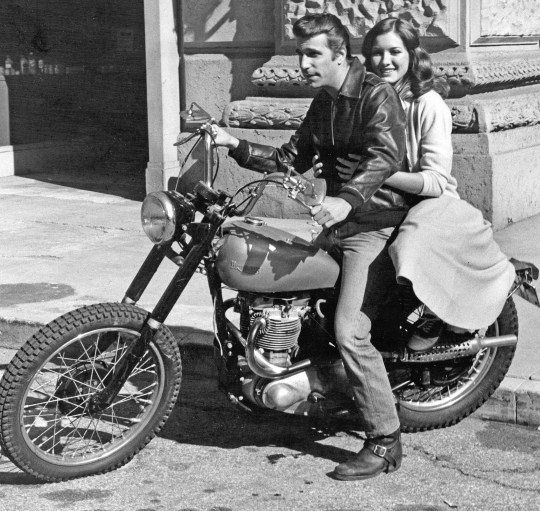
Look, he's The Fonz, what more is there to say?
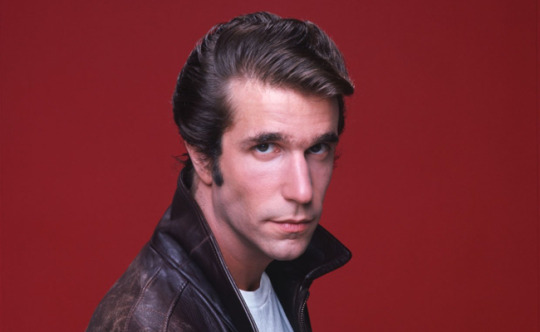
youtube
Wayne Rogers:
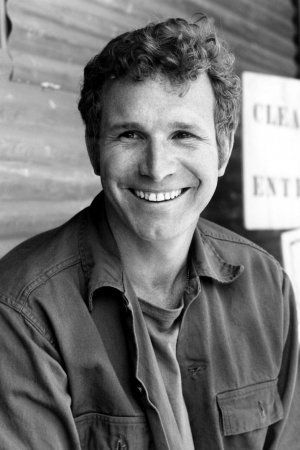
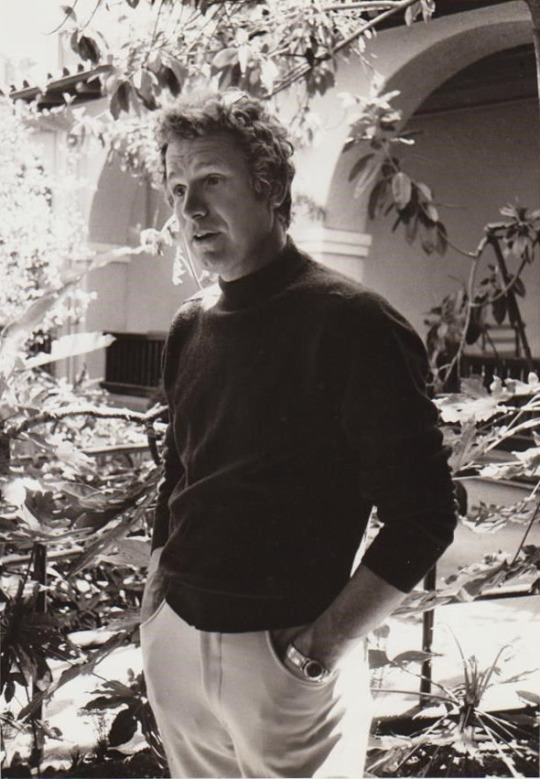
He just had this warmth and gentleness to him that made him sooo attractive no matter at what age. If his good looks and his charming smile (and those curls ahh!) aren't enough to convince you to vote for this nice, funny, 6ft tall man, then let me hit you with some random information What i adore is the duality of this man! First he served his duty in the navy and was about to study law when he accompanied a friend to a theatre play one evening and was so amazed by the art of acting that he decided to achieve an acting career instead. When he wanted to leave MASH after only three seasons -although the contract said for him to stay much longer-, they couldn't do anything about it bc he hadn't even signed it in the first place (there was a paragraph in it that he strongly disagreed with). If that isn't badass idk what is! And later in his career, not only did he act, write and produce all kinds of TV, movie and stage productions but he also started a successful financial business. Also (at least when he was older) he supposedly went for a swim in the sea EVERY morning. Btw when he was still getting started and was financially struggling, he shared a flat in New York and an overcoat for auditions with (also still struggling) colleague Peter Falk.
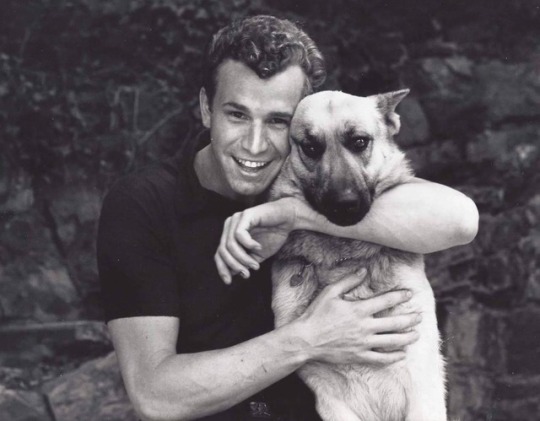
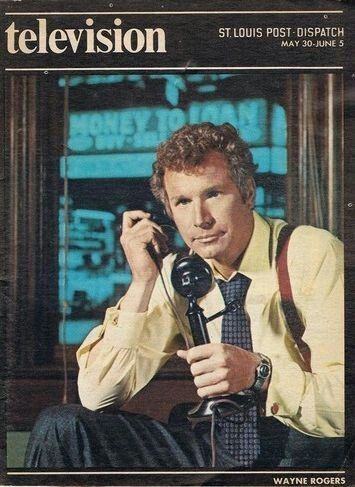

youtube
72 notes
·
View notes
Text
Churchill in Moscow
So I went to see this last night. Mini review below. No real spoilers but obviously don’t read on if you want to see it completely fresh..
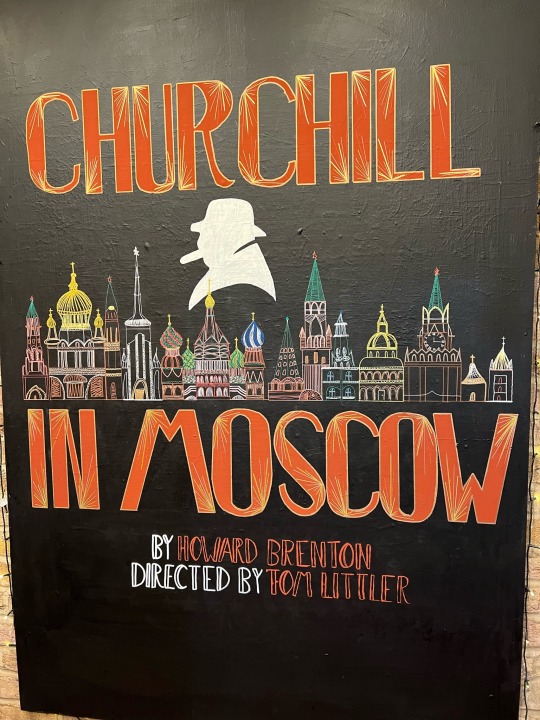
I really enjoyed the play, it’s well written and has a very strong cast overall. As with HIA it’s very wordy and is quite a lot longer, running at 2h15, but it keeps a reasonable pace throughout.
Roger has incredible stage presence and is compelling to watch. Thankfully he doesn’t do a corny Churchill impression but he is really convincing in the role and looks the part too with the bald cap.
The actor who plays Stalin is equally strong and their rapport on stage is great.
I expected his voice and projection to be good (which it is) but his physicality in the role is also really good and I found it so interesting to watch him in such close proximity. It’s what’s so amazing about the OT - that it’s so small it’s almost like watching a TV performance as you can see every nuance and expression.
There’s some really funny parts in the play and Roger’s comic timing is fantastic… (actually all the cast have brilliant comic timing). There were bits that brought ‘Cabin Pressure’ and The Thick of It to mind and some bits really are laugh out loud funny.
Also a shout out to the two translators who add some perfect comic elements to the role but also manage a depth of characterisation that gives added tension and depth at key moments. I didn’t know either of the actors in these roles but they were fab.
The only weak link (for me) is Svetlana (Stalin’s daughter) - both in terms of the script and to some extent the acting. There was honestly little point to her role in my view and it would have been just as good without.
The intimacy of the theatre is amazing and it’s another play that really benefits from being up close and slightly claustrophobic. The set design - as for HIA - is really simple but very effective. Also watching Roger act that close up is pretty special
Definitely worth a watch on streaming if you get chance

#Roger Allam#orange tree theatre#Churchill in Moscow#Roger does theatre#collecting endeavour cast theatre moments all this year#Anton in Hamlet next…#hurrah for theatre opportunities#even if no Evans on this occasion#although it was lovely to go back to the OT#and relive my HIA experience#can we go back in time to the autumn#that was such a great few weeks
27 notes
·
View notes
Text
I know I'm SO late to the party, but In light of the hbomberguy video, I wanted to drop a list of some of my favorite video essayists on here who are all great. Some are well known, some of them not, but all deserve a lot of love thrown their way!
Any creators I know are Queer will have a * next to their names if that's what you're looking for! (Note some of them might not have a star that should, that's not me trying to invalidate anybody I just didn't know, please feel free to correct me!)
Dominic Noble- book content! Has a series called Lost in Adaptation that judges how faithful movie adaptations of books were to their original source material, but also does some reviews/summaries as well. Very publicly denounced JKR after she was revealed to be a TERF and stated he will no longer review anything by her on his channel. Also deleted ALL of his HP videos after finding out she was a TERF (which were his most popular videos), so I have a really deep respect for him tbh. Former Channel Awesome member who publicly denounced them on several occasions, and an all around swell guy.
*Overly Sarcastic Productions- channel run by 2 people who go by Red and Blue. History and Mythology/Literature content, as well as analysis of tropes and media! I've been told their History content can be a bit... Iffy, but I'm not a Historian so I don't know, however if they get something wrong they're good about correcting it for what that counts for. Very interesting to listen to, I've watched Red's Videos roughly 100 times each. Also has a podcast.
*Strange Aeons- fandom/Tumblr history mostly, as well as some history, and weird businesses too. Reads a LOT of cursed content for her channel.
*Lindsay Ellis- Media/film analysis. obviously not as unknown as some of the others on here, but I absolutely adore her content and will forever be sad that she isn't on YouTube anymore.
Cruel World Happy Mind- MLM/explanation of controversial figures. I'm not sure how best to explain her content, but she seems genuinely lovely and is interesting to listen to. Also a victim of Illuminaughtii's ire and deserves some love. The video she made on Blair is a bit outdated since she made it at the start of when this all came to light, but imo it's definitely worth a watch. Her talking about her interaction with Blair genuinely broke my heart.
*Night Mind- Analog horror/Unfiction/ARG content! Analyzes and explains various internet horror pieces, and also has a very nice voice to listen to.
*Lola Sebastian- Film/Media Analysis!
Li Speaks- Deep dives into various nostalgia, mainly flash games!
*Princess Weekes- Media/film/literary analysis!
abitfrank- summaries and analysis of various "darker" children's content such as Coraline (book and movie), Nightmare Before Christmas, and various dark fairy tales
Hello Future Me- writing advice and world building information!
Curious Archive- deep dives into the various bestiaries of video games and the animals in real life that they're similar to, I love his Subnautica video!
In Praise of Shadows- Horror media analysis! Will often focus on specific franchises, but also covers things like horror comics and tropes as well.
Wait in the Wings- theatre! Deep dives into the back stories behind the production of various musicals! His video on Rogers the Musical that he did for April Fool's last year is comedy fucking gold
Weird Reads With Emily Louise- conspiracy theory/cult/weird thing analysis! Looks at things from an objective and skeptical view, and is very in depth. Recently served as a consulting producer on an HBO Max documentary on the Love has Won cult.
Ask a Mortician- death content! Covers various historical events and darker stories of death from the view of a Mortician.
*Izzzyzz- deep dives into fandoms, as well as well as different video games and kids' virtual worlds.
Disney Dan- Disney content! Covers the history of different mascot costumes at Disney and Disney-like parks! Has collaborated with Definctland in the past too!
Yesterworld- theme park content! Discusses history behind rides and parks, as well as some Disney movies. I think has also collaborated with Defunctland and Disney Dan?
Legal Eagle- legal content! Breaks down news about ongoing legal cases in a way that feels approachable. I like him because both my parents are paralegals and his videos have helped me understand what they mean when they're talking about work a little bit
Super Eye patch Wolf- media video essays! Mostly about anime/manga and video games, but also covers things like influencer scams and pro wrestling. His "what the internet did to Garfield" video is SO GOOD
*Jessie Gender- Media Analysis, loves Star Trek
*Laura Crone- Media Analysis video essays, her videos on the Swan Princess are fucking great I highly recommend!
*Lady Emily- Media Analysis, did a whole video on Spuder-Man turn off the dark that is SO good. Co writer for Sarah Z
Tale Foundry- covers different forms of fiction, their xenofiction video is great, as is their Angelarium one!
Defunctland- Theme Park ride and Children's TV History channel!
Jenny Nicholson- one of the sort of "big three" commentary channels with Lindsay Ellis and Sarah Z imo, covers all sorts of stuff but her most recent one is a 3 hour video on the theme park Evermore Park!
*Sarah Z- Fandom history and Media analysis! I really enjoy their content, the Johnlock Conspiracy and DashCon videos are my favorites!
Li Speaks- Flash games/virtual world analysis mostly! She has a very soothing voice to listen to, if you played like. Any MMOs or virtual worlds growing up I Highly recommend. I've watched her video on Horseland SO many times.
*Codex Entry- Video game coverage! Her videos on Pathologic are great if you're like me and wanted more after the Hbomberguy video!
Wendigoon- ARG/Spooky content! One of the early proponents of the Mandela Catalog and best known for his conspiracy theory iceberg, but has also covered things like various weird/unsolved crimes, Assassination conspiracies, and other things. His videos on Faith, Blood Meridian, The Mandela Catalog, and his Religion/Cult iceberg are some of my favorites
Dino Diego- Dinosaur fiction, like movies, video games, books, short stories, etc. his 2 videos on West of Eden and Winter in Eden are two of my favorites!
Haley Whipjack- I don't know how to describe her content really? She does a lot of deep dives (her Shrek one is my favorite), currently doing a recap of Once Upon a Time by season that is very fun. She's an elementary school teacher by day (that's not me dozing her she talks about it on her channel), and so she has fun unhinged teacher energy!
Other channels that are a sort of collection of different people talking about different things rather than 1 or 2:
TEDx
PBS
The Exploring Series
#james somerton#hbomberguy#i know this is late#i meant to post this a while ago but i had so many to catalog#video essays#video essayist
121 notes
·
View notes
Text
Watching Agatha All Along again after giving up on Marvel for three years made me think about why I gave it up in the first place.
I was so deep in the MCU. I cried so much during Infinity War that I struggled to walk out of the cinema. I watched Endgame on the first day that it was released. My diary was a CACW notebook. Part of the reason I took up STEM subjects was because of Marvel.
And then after watching MoM in theatres, I stopped.
I'm trying to phrase and figure out what made me give up something I was so invested in, something I loved so much. I think I know why.
The MCU period I was active in gave me characters that I ended up loving, and the later period took them away.
My two favourite characters were ruined. Their character arcs and core characters undone. I'm worried about my favourite too.
I hate it when the sequel undermines the previous works.
When I think of Steve Rogers, I don't think of the guy who chose to either fuck up the entire timeline of the MCU or sat quietly and watch the world in turmoil, his allies die tragically, and his best friend left to a fate worst than dead to get with a girl he wasn't even dating, a woman who had a life of her own and moved on.
I think of Steve from CATWS, the guy from Brooklyn who still does the right thing in a time when morals are blurred. The Steve who is kind, compassionate and brave. The Steve who inspired the base-level employees of SHEILD to follow his example and not bow down in the face of tyranny. The Steve who just had one mission, and that was standing up to bullies.
When I think of Wanda, I don't think of the insane, manic witch/evil goddess who killed thousands mercilessly even though there was a harmless solution, who after all she lost, somehow only wanted her children who she had for three days instead of also her love and her twin.
I think of Wanda, the girl who lost it all, who's family was all killed, who was denied a burial for Vision, who was left alone and abandoned in the world, with so much love in her heart that no longer had a place, a person to go to. The girl who feels so much so deeply that it bended reality. The girl who had to learn, who had to give up her dream, but did so, because at the end of the day, she is a kind person, who doesn't want to hurt people. She was wrong, she takes time to understand and accept the harm she's caused (as we all do), and then makes it right. She tries to be good. Despite everything, she tries.
The later stages of MCU took these two characters that mean so much to me personally, and ruined them.
And I'm fucking mad at them, because it disrespected all the work that made me love them in the first place, and it was preventable. (The original script for MoM where Wanda helps Strange but repeatedly gets tempted by the Darkhold is a much more convincing narrative.)
And I'd say the same applies to others: Natasha, Thor, Bruce, even Strange (although I feel like they never really figured out what they wanted to do with Strange's character)
I miss my characters, I miss my MCU.
#mcu#mcu criticism#marvel#endgame critical#steve rogers#wanda maximoff#mcu thoughts#meraki essay#this is why I get so worried about sequels#rwrb pls don't make this mistake#i want to trust matthew and casey and to an large extent i do#i'm just really scared#also the other favourite character is bucky#i think starting from infinity they did him dirty#my feelings on fatws are... complicated#and why the fuck is he a congressman#he's such a cool character in the comic#and seb does him so well#but he was at his peak during catws#arguably the most comic accurate period for him#so idk what his future holds but i'm holding my breath
48 notes
·
View notes
Text
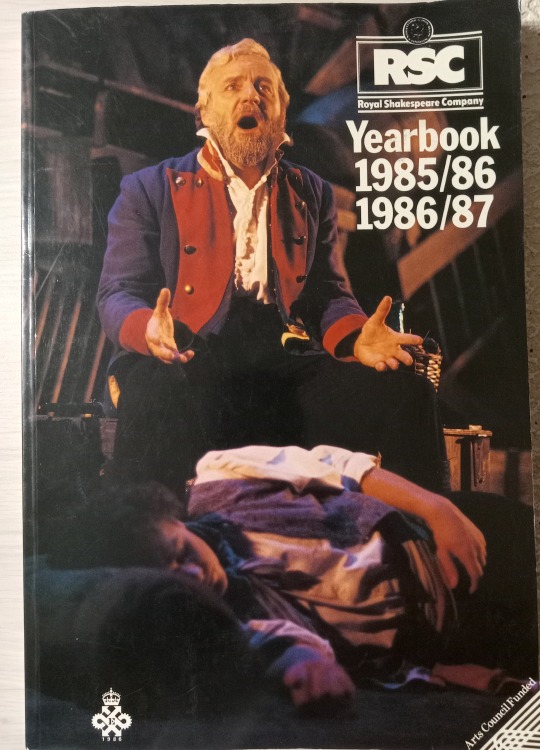
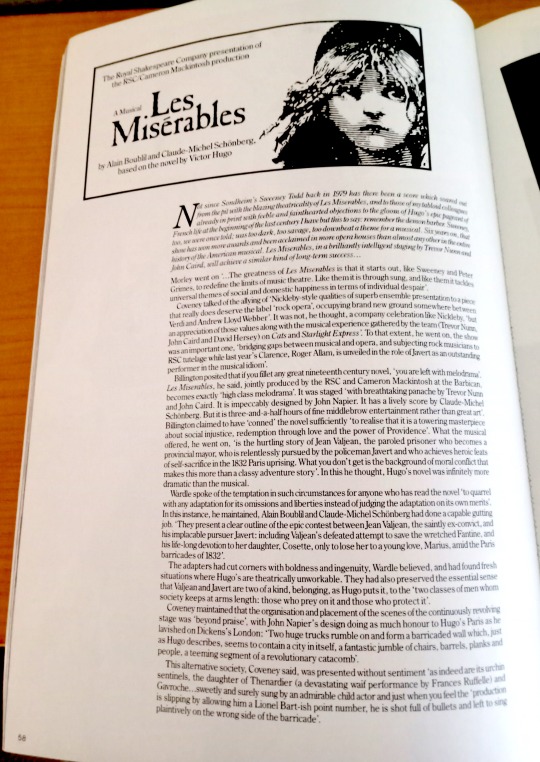
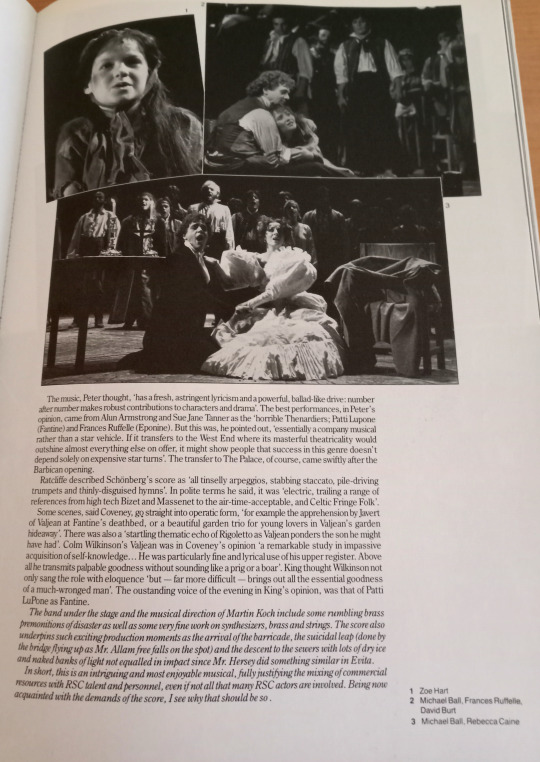
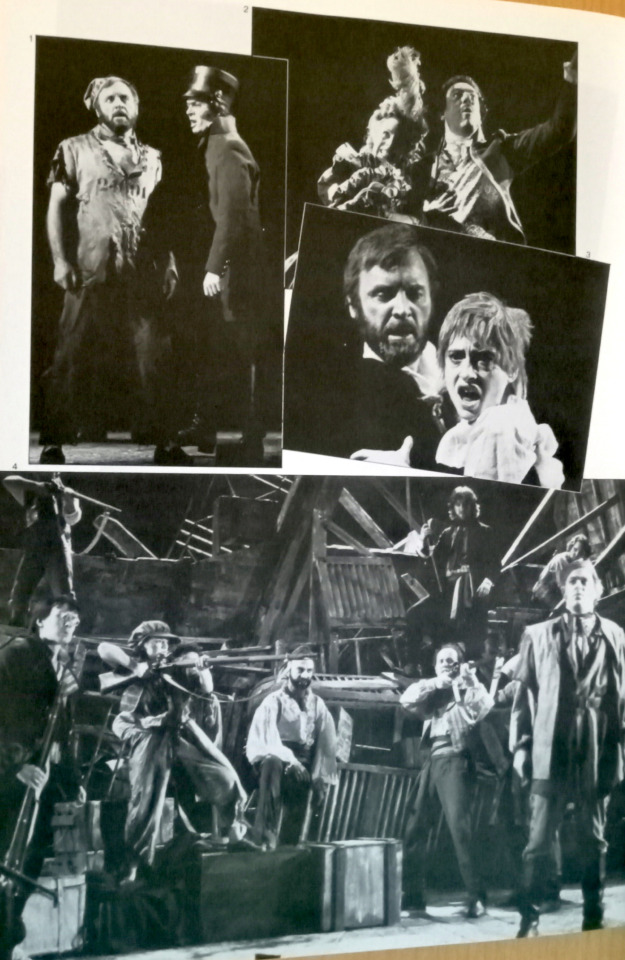
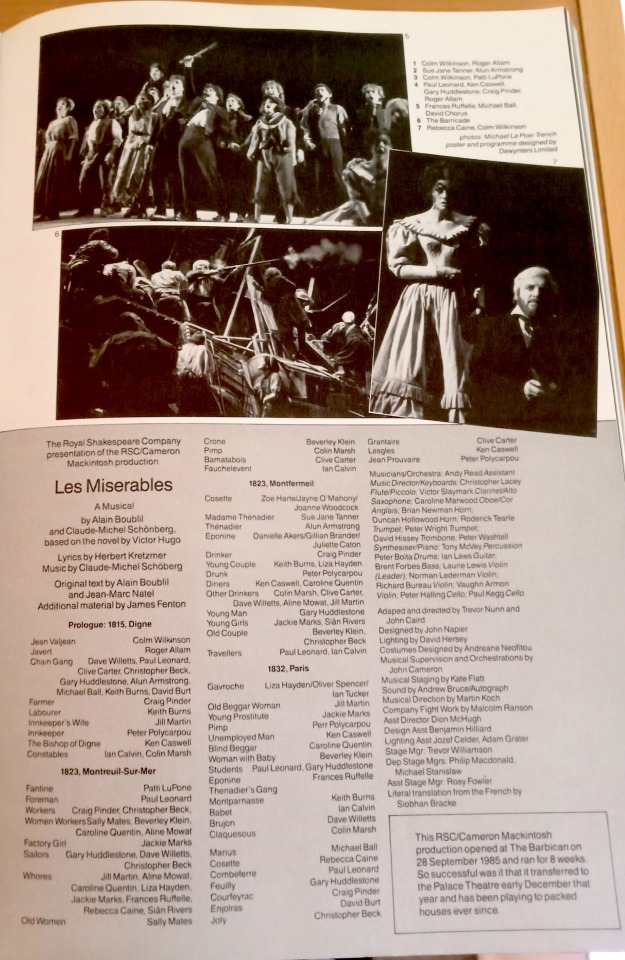
Happy 39th birthday to the London production of Les Misérables (which officially opened on 8 October 1985 at the Barbican Theatre, though previews began at the end of September)! By way of celebrations, scans from the 1985/86 / 1986/87 Royal Shakespeare Company Yearbook, which honoured the success of the Barbican production and its transfer to the Palace Theatre by making Colm Wilkinson and Michael Ball during 'Bring Him Home' its cover stars. The annual RSC Yearbook summarised productions in all of the company's (at the time five) theatres and on tour with production photography and critical commentary from newspapers and other media. Text from the pages above is under the cut below, with bracketed extra information to clarify some references.
Not since Sondheim’s Sweeney Todd back in 1979 has there been a score which soared out of the pit with the blazing theatricality of Les Misérables, and to those of my tabloid colleagues already in print with feeble and fainthearted objections to the show, I have but this to say: remember the demon barber. Sweeney, too, we were once told; was too dark, too savage, too downbeat a theme for a musical. Six years on, that show has won more awards and been acclaimed to more opera houses than any other in the entire history of the American musical. Les Misérables, in a brilliantly intelligent staging by Trevor Nunn and John Caird, will achieve a similar kind of long-term success …
[The Times’/Punch’s Sheridan] Morley went on. ‘… The greatness of Les Misérables is that it starts out, like Sweeney and Peter Grimes, to redefine the limits of music theatre. Like them it is through sung, and like them it tackles universal themes of social and domestic happiness in terms of individual despair.’
[The Financial Times’ Michael] Coveney talked of the allying of ‘Nickleby*-style qualities of ensemble presentation to a piece that really does deserve the label ‘rock opera’, occupying brand new ground somewhere between Verdi and Andrew Lloyd Webber. It was not, he thought, a company celebration like Nickleby, ‘but an appreciation of those values along with the musical experience gathered by the team (Trevor Nunn, John Caird and David Hersey) on Cats and Starlight Express.’ To that extent, he went on, the show was an important one, ‘bridging gaps between musical and opera, and subjecting rock musicians to RSC tutelage while last year’s Clarence [in the RSC 1984 production of Richard III], Roger Allam, is unveiled in the role of Javert as an outstanding performer in the musical idiom.’
[*The RSC's landmark 1980 production of an adaption of Charles Dickens’ The Life and Adventures of Nicholas Nickleby]
[The Guardian’s Michael] Billington posited that if you fillet any great nineteenth-century novel, ‘you are left with melodrama.’ Les Misérables, he said, jointly produced by the RSC and Cameron Mackintosh at the Barbican, becomes exactly ‘high class melodrama.’ It was staged ‘with breathtaking panache by Trevor Nunn and John Caird. It is impeccably designed by John Napier. It has a lively score by Claude-Michel Schönberg. But it is three-and-a-half hours of fine middlebrow entertainment rather than great art.’ Billington claimed to have ‘conned’ the novel sufficiently ‘to realise that it is a towering masterpiece about social injustice, redemption through love and the power of Providence.’ What the musical offered, he went on, ‘is the hurtling story of Jean Valjean, the paroled prisoner who becomes a provincial mayor, who is relentlessly pursued by the policeman Javert and who achieves heroic feats of self-sacrifice at the 1832 Paris uprising. What you don’t get is the background of moral conflict that makes this more than a classy adventure story.’ In this he thought, Hugo’s novel was infinitely more dramatic than the musical.
[The Times’ Irving] Wardle spoke of the temptation in such circumstances for anyone who has read the novel ‘to quarrel with any adaptation for its omissions and liberties instead of judging the adaptation on its own merits.’ In this instance, he maintained, Alain Boublil and Claude-Michel Schönberg had done a capable gutting job. ‘They present a clear outline of the epic contest between Jean Valjean, the saintly ex-convict, and his implacable pursuer Javert: including Valjean’s defeated attempt to save the wretched Fantine, and his life-long devotion to her daughter, Cosette, only to lose her to a young love, Marius, amid the Paris barricades of 1832.’
The adapters had cut corners with boldness and ingenuity, Wardle believed, and had found fresh situations where Hugo’s are theatrically unworkable. They had also preserved the essential sense that Valjean and Javert are two of a kind, belonging, as Hugo puts it, to the ‘two classes of men whom society keeps at arms length: those who prey on it and those who protect it.’
Coveney maintained that the organization and placement of the continuously revolving stage was ‘beyond praise’, with John Napier’s design doing as much honour to Hugo’s Paris as he lavished on Dickens’s London [in Nickleby]: ‘Two huge trucks rumble on and form a barricaded wall which, just as Hugo describes, seems to contain a city in itself, a fantastic jumble of chairs, barrels, planks and people, a teeming segment of a revolutionary catacomb.’
This alternative society, Coveney said, was presented without sentiment ‘as indeed are its urchin sentinels, the daughter of Thenardier (a devastating waif performance by Frances Ruffelle) and Gavroche … sweetly and surely sung by an admirable child actor and just when you feel the production is slipping by allowing a [writer of Oliver] Lionel Bart-ish point number, he is shot full of bullets and left to sing plaintively on the wrong side of the barricade.’
The music, [The Sunday Times’ John] Peter though, ‘has a fresh, astringent lyricism and a powerful, ballad-like drive: number after number makes robust contributions to character and drama.’ The best performances, in Peter’s opinion, came from Alun Armstrong and Susan Jane Tanner as the ‘horrible Thenardiers', Patti LuPone (Fantine) and Frances Ruffelle (Eponine). But this was, he pointed out, ‘essentially a company musical rather than a star vehicle. If it transfers to the West End where its masterful theatricality would outshine almost anything else on offer, it might show people that success in this genre doesn’t depend solely on expensive star turns.’ The transfer to the Palace, of course, came swiftly after the Barbican opening.
[The Observer’s Michael] Ratcliffe described Schönberg’s score as ‘all tinselly arpeggios, stabbing staccato, pile-driving trumpets and thinly-disguised hymns.’ In polite terms he said, it was ‘electric, trailing a range of references from high-tech Bizet and Massenet to the air-time acceptable, and Celtic Fringe Folk.’
Some scenes, said Coveney, go straight into operatic form, ‘for example the apprehension by Javert of Valjean at Fantine’s deathbed, or a beautiful garden trio for young lovers in Valjean’s garden hideaway.’ There was also a ‘startling thematic echo of Rigoletto as Valjean ponders the son he might have had.’ Colm Wilkinson’s Valjean was in Coveney’s opinion ‘a remarkable study in impassive acquisition of self-knowledge … He [has] particularly fine and lyrical use of his upper register. Above all he transmits palpable goodness without sounding like a prig or a boar [bore?].’ [The Sunday’s Telegraph’s Francis] King thought Wilkinson not only sang the role with eloquence ‘but – far more difficult – brings out the essential goodness of a much-wronged man.’ The outstanding voice of the evening in King’s opinion, was that of Patti LuPone as Fantine.
The band under the stage and the musical direction of Martin Koch include some rumbling brass premonitions of disaster as well as some very fine work on synthesizers, brass and strings. The score also underpins such exciting production movements as the arrival of the barricade, the suicidal leap (done by the bridge flying up as Mr Allam free falls on the spot) and the descent to the sewers with lots of dry ice and naked banks of light not equalled in impact since Mr Hersey did something similar in Evita.
In short, this is an intriguing and most enjoyable musical, fully justifying the mixing of commercial resources with RSC talent and personnel, even if not all that many RSC actors are involved.* Being now acquainted with the demands of the score, I see why that should be so. [Morley]
[* The RSC members who appeared in the Barbican production were Roger Allam, Alun Armstrong, and Susan Jane Tanner. Other RSC members at this time joined Les Mis in later companies, among them David Delve, who would replace Alun Armstrong as Thenardier.]
37 notes
·
View notes
Text
(Mostly) Lost, but Not Forgotten: Omar Khayyam (1923) / A Lover’s Oath (1925)

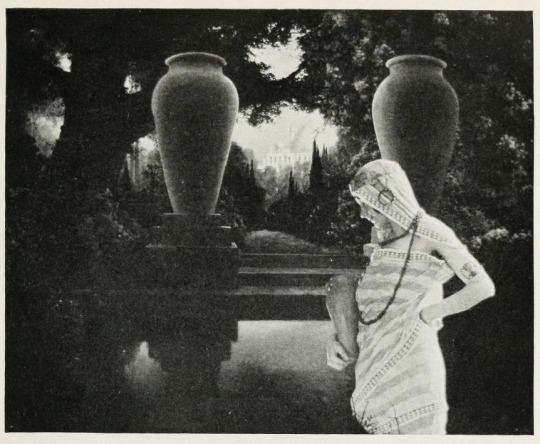
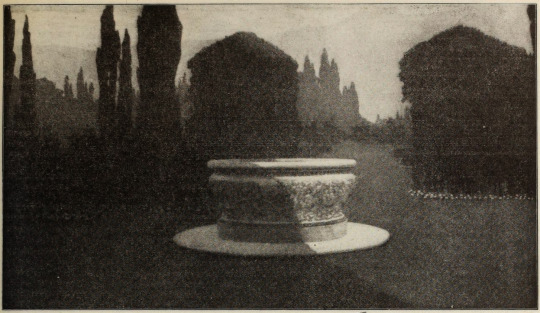

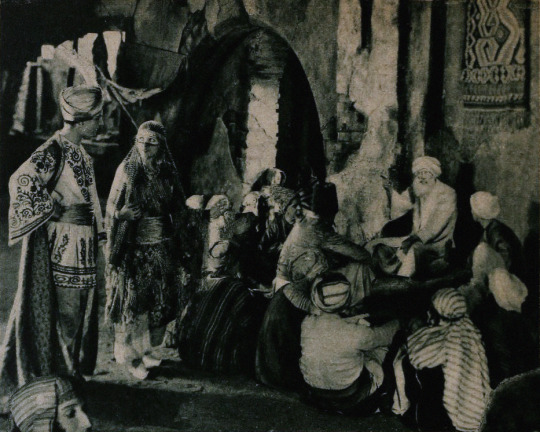
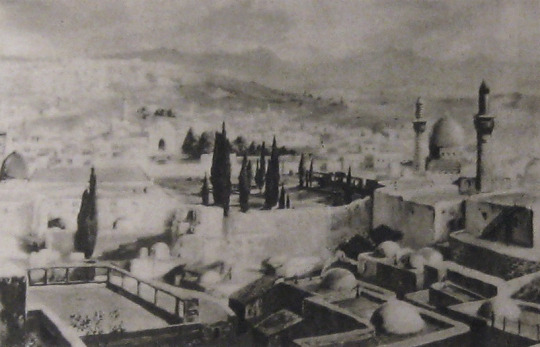
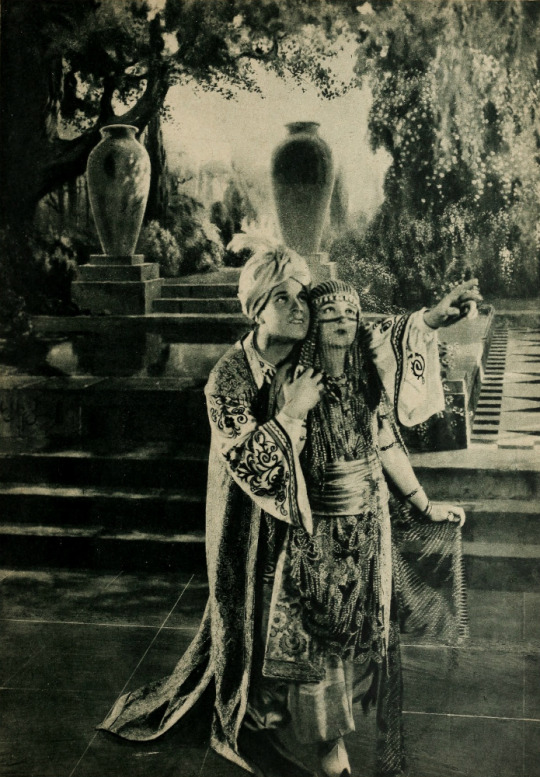
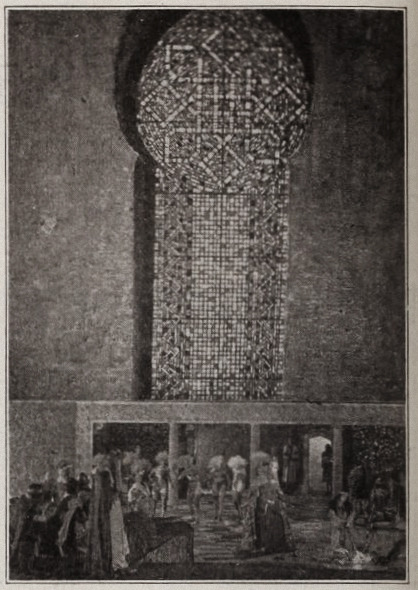
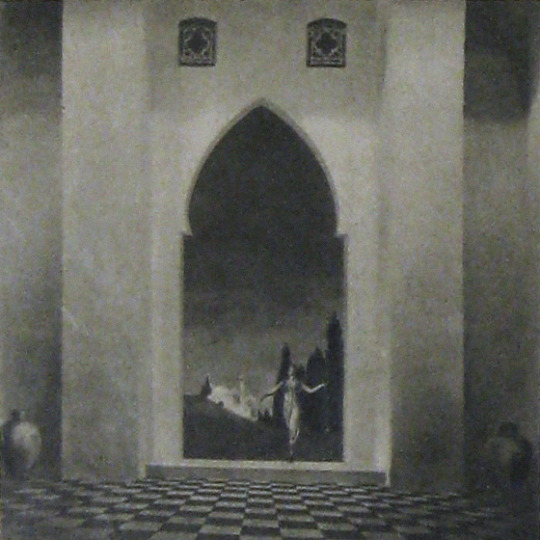
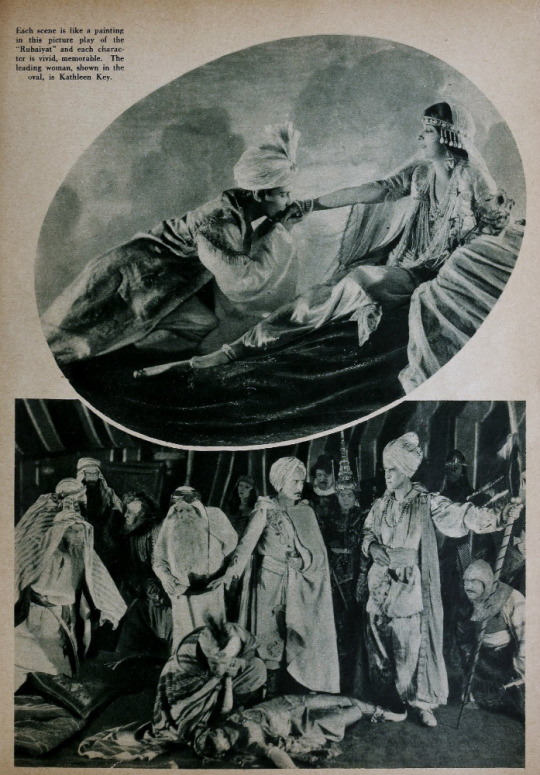
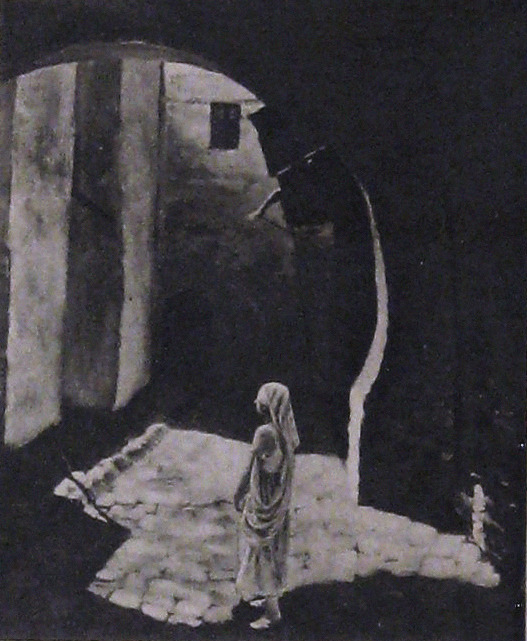

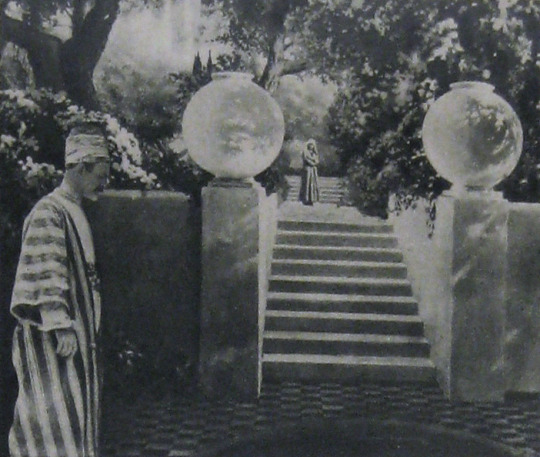
Alternate Titles: The Rubaiyat of Omar Khayyam, The Rubaiyat, Omar Khayyam, Omar
Direction: Ferdinand Pinney Earle; assisted by Walter Mayo
Scenario: Ferdinand P. Earle
Titles: Marion Ainslee, Ferdinand P. Earle (Omar), Louis Weadock (A Lover’s Oath)
Inspired by: The Rubaiyat of Omar Khayyam, as edited & translated by Edward FitzGerald
Production Manager: Winthrop Kelly
Camera: Georges Benoit
Still Photography: Edward S. Curtis
Special Photographic Effects: Ferdinand P. Earle, Gordon Bishop Pollock
Composer: Charles Wakefield Cadman
Editors: Arthur D. Ripley (The Rubaiyat of Omar Khayyam version), Ethel Davey & Ferdinand P. Earle (Omar / Omar Khayyam, the Director’s cut of 1922), Milton Sills (A Lover’s Oath)
Scenic Artists: Frank E. Berier, Xavier Muchado, Anthony Vecchio, Paul Detlefsen, Flora Smith, Jean Little Cyr, Robert Sterner, Ralph Willis
Character Designer: Louis Hels
Choreography: Ramon Novarro (credited as Ramon Samaniegos)
Technical Advisors: Prince Raphael Emmanuel, Reverend Allan Moore, Captain Dudley S. Corlette, & Captain Montlock or Mortlock
Studio: Ferdinand P. Earle Productions / The Rubaiyat, Inc. (Production) & Eastern Film Corporation (Distribution, Omar), Astor Distribution Corporation [States Rights market] (Distribution, A Lover’s Oath)
Performers: Frederick Warde, Edwin Stevens, Hedwiga Reicher, Mariska Aldrich, Paul Weigel, Robert Anderson, Arthur Carewe, Jesse Weldon, Snitz Edwards, Warren Rogers, Ramon Novarro (originally credited as Ramon Samaniegos), Big Jim Marcus, Kathleen Key, Charles A. Post, Phillippe de Lacy, Ferdinand Pinney Earle
Premiere(s): Omar cut: April 1922 The Ambassador Theatre, New York, NY (Preview Screening), 12 October 1923, Loew’s New York, New York, NY (Preview Screening), 2 February 1923, Hoyt’s Theatre, Sydney, Australia (Initial Release)
Status: Presumed lost, save for one 30 second fragment preserved by the Academy Film Archive, and a 2.5 minute fragment preserved by a private collector (Old Films & Stuff)
Length: Omar Khayyam: 8 reels , 76 minutes; A Lover’s Oath: 6 reels, 5,845 feet (though once listed with a runtime of 76 minutes, which doesn’t line up with the stated length of this cut)
Synopsis (synthesized from magazine summaries of the plot):
Omar Khayyam:
Set in 12th century Persia, the story begins with a preface in the youth of Omar Khayyam (Warde). Omar and his friends, Nizam (Weigel) and Hassan (Stevens), make a pact that whichever one of them becomes a success in life first will help out the others. In adulthood, Nizam has become a potentate and has given Omar a position so that he may continue his studies in mathematics and astronomy. Hassan, however, has grown into quite the villain. When he is expelled from the kingdom, he plots to kidnap Shireen (Key), the sheik’s daughter. Shireen is in love with Ali (Novarro). In the end it’s Hassan’s wife (Reicher) who slays the villain then kills herself.
A Lover’s Oath:
The daughter of a sheik, Shireen (Key), is in love with Ali (Novarro), the son of the ruler of a neighboring kingdom. Hassan covets Shireen and plots to kidnap her. Hassan is foiled by his wife. [The Sills’ edit places Ali and Shireen as protagonists, but there was little to no re-shooting done (absolutely none with Key or Novarro). So, most critics note how odd it is that all Ali does in the film is pitch woo, and does not save Shireen himself. This obviously wouldn’t have been an issue in the earlier cut, where Ali is a supporting character, often not even named in summaries and news items. Additional note: Post’s credit changes from “Vizier” to “Commander of the Faithful”]
Additional sequence(s) featured in the film (but I’m not sure where they fit in the continuity):
Celestial sequences featuring stars and planets moving through the cosmos
Angels spinning in a cyclone up to the heavens
A Potters’ shop sequence (relevant to a specific section of the poems)
Harem dance sequence choreographed by Novarro
Locations: palace gardens, street and marketplace scenes, ancient ruins
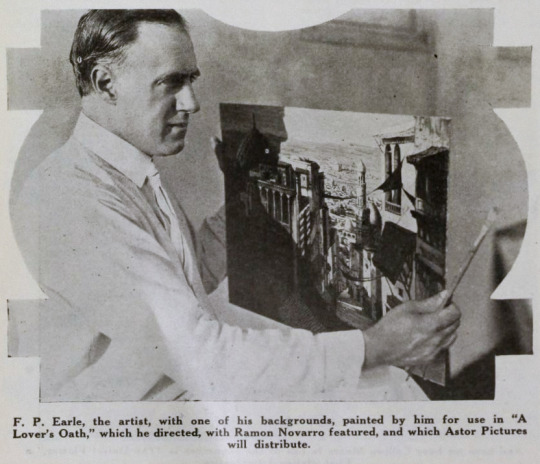
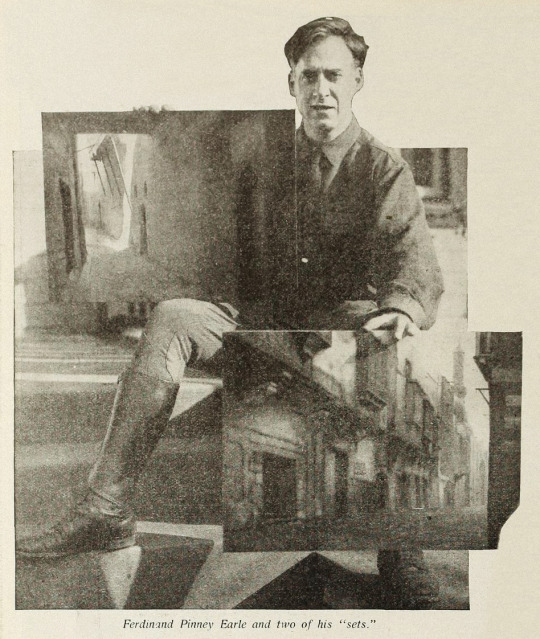
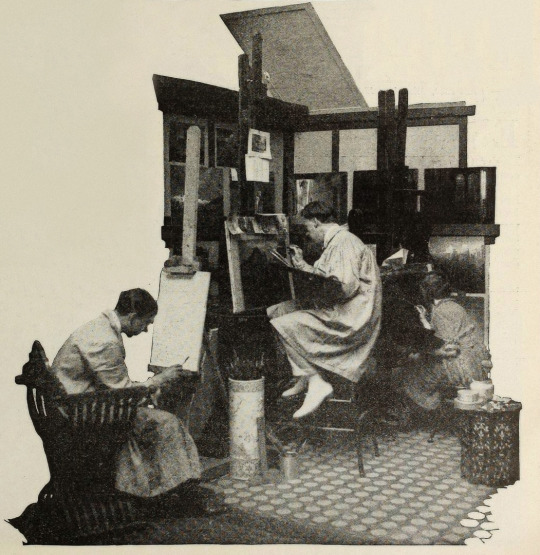
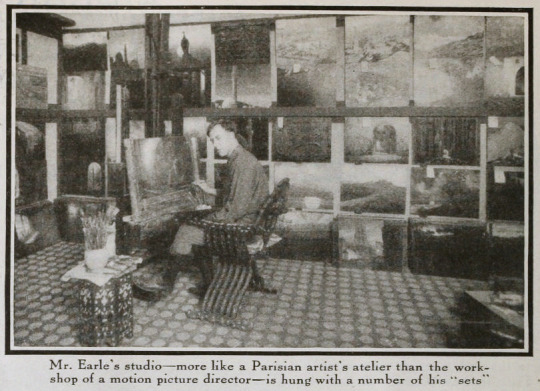
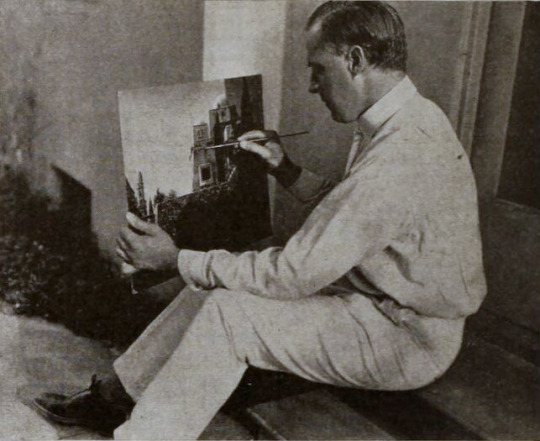
Points of Interest:
“The screen has been described as the last word in realism, but why confine it there? It can also be the last word in imaginative expression.”
Ferdinand P. Earle as quoted in Exhibitors Trade Review, 4 March 1922
The Rubaiyat of Omar Khayyam was a massive best seller. Ferdinand Pinney Earle was a classically trained artist who studied under William-Adolphe Bougueraeu and James McNeill Whistler in his youth. He also had years of experience creating art backgrounds, matte paintings, and art titles for films. Charles Wakefield Cadman was an accomplished composer of songs, operas, and operettas. Georges Benoit and Gordon Pollock were experienced photographic technicians. Edward S. Curtis was a widely renowned still photographer. Ramon Novarro was a name nobody knew yet—but they would soon enough.
When Earle chose The Rubaiyat as the source material for his directorial debut and collected such skilled collaborators, it seemed likely that the resulting film would be a landmark in the art of American cinema. Quite a few people who saw Earle’s Rubaiyat truly thought it would be:
William E. Wing writing for Camera, 9 September 1922, wrote:
“Mr. Earle…came from the world of brush and canvass, to spread his art upon the greater screen. He created a new Rubaiyat with such spiritual colors, that they swayed.” … “It has been my fortune to see some of the most wonderful sets that this Old Earth possesses, but I may truly say that none seized me more suddenly, or broke with greater, sudden inspiration upon the view and the brain, than some of Ferdinand Earle’s backgrounds, in his Rubaiyat. “His vision and inspired art seem to promise something bigger and better for the future screen.”
As quoted in an ad in Film Year Book, 1923:
“Ferdinand Earle has set a new standard of production to live up to.”
Rex Ingram
“Fifty years ahead of the time.”
Marshall Neilan
The film was also listed among Fritz Lang’s Siegfried, Chaplin’s Gold Rush, Fairbanks’ Don Q, Lon Chaney’s Phantom of the Opera and The Unholy Three, and Erich Von Stroheim’s Merry Widow by the National Board of Review as an exceptional film of 1925.
So why don’t we all know about this film? (Spoiler: it’s not just because it’s lost!)
The short answer is that multiple dubious legal challenges arose that prevented Omar’s general release in the US. The long answer follows BELOW THE JUMP!
Earle began the project in earnest in 1919. Committing The Rubaiyat to film was an ambitious undertaking for a first-time director and Earle was striking out at a time when the American film industry was developing an inferiority complex about the level of artistry in their creative output. Earle was one of a number of artists in the film colony who were going independent of the emergent studio system for greater protections of their creative freedoms.
In their adaptation of The Rubaiyat of Omar Khayyam, Earle and Co. hoped to develop new and perfect existing techniques for incorporating live-action performers with paintings and expand the idea of what could be accomplished with photographic effects in filmmaking. The Rubaiyat was an inspired choice. It’s not a narrative, but a collection of poetry. This gave Earle the opportunity to intersperse fantastical, poetic sequences throughout a story set in the lifetime of Omar Khayyam, the credited writer of the poems. In addition to the fantastic, Earle’s team would recreate 12th century Persia for the screen.
Earle was convinced that if his methods were perfected, it wouldn’t matter when or where a scene was set, it would not just be possible but practical to put on film. For The Rubaiyat, the majority of shooting was done against black velvet and various matte photography and multiple exposure techniques were employed to bring a setting 800+ years in the past and 1000s of miles removed to life before a camera in a cottage in Los Angeles.
Note: If you’d like to learn a bit more about how these effects were executed at the time, see the first installment of How’d They Do That.
Unfortunately, the few surviving minutes don’t feature much of this special photography, but what does survive looks exquisite:
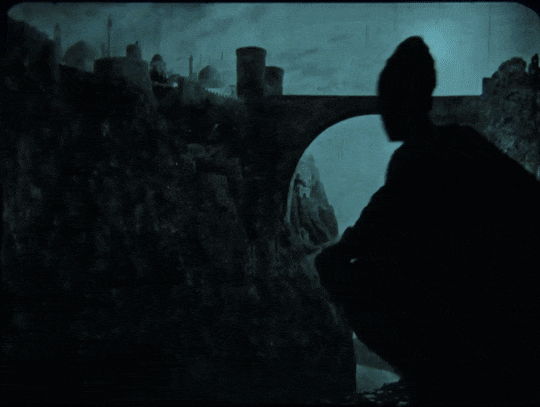
see all gifs here
Earle, knowing that traditional stills could not be taken while filming, brought in Edward S. Curtis. Curtis developed techniques in still photography to replicate the look of the photographic effects used for the film. So, even though the film hasn’t survived, we have some pretty great looking representations of some of the 1000s of missing feet of the film.
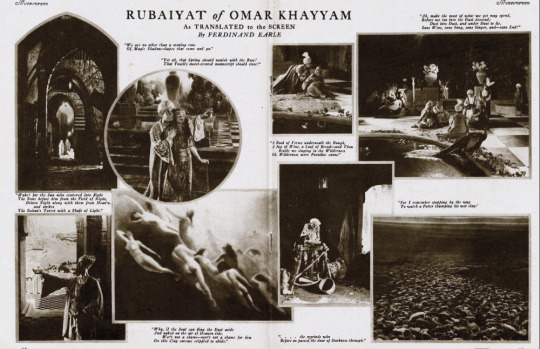
Nearly a year before Curtis joined the crew, Earle began collaboration with composer Charles Wakefield Cadman. In another bold creative move, Cadman and Earle worked closely before principal photography began so that the score could inform the construction and rhythm of the film and vice versa.
By the end of 1921 the film was complete. After roughly 9 months and the creation of over 500 paintings, The Rubaiyat was almost ready to meet its public. However, the investors in The Rubaiyat, Inc., the corporation formed by Earle to produce the film, objected to the ample reference to wine drinking (a comical objection if you’ve read the poems) and wanted the roles of the young lovers (played by as yet unknown Ramon Novarro and Kathleen Key) to be expanded. The dispute with Earle became so heated that the financiers absconded with the bulk of the film to New York. Earle filed suit against them in December to prevent them from screening their butchered and incomplete cut. Cadman supported Earle by withholding the use of his score for the film.
Later, Eastern Film Corp. brokered a settlement between the two parties, where Earle would get final cut of the film and Eastern would handle its release. Earle and Eastern agreed to change the title from The Rubaiyat of Omar Khayyam to simply Omar. Omar had its first official preview in New York City. It was tentatively announced that the film would have a wide release in the autumn.
However, before that autumn, director Norman Dawn launched a dubious patent-infringement suit against Earle and others. Dawn claimed that he owned the sole right to use multiple exposures, glass painting for single exposure, and other techniques that involved combining live action with paintings. All the cited techniques had been widespread in the film industry for a decade already and eventually and expectedly Dawn lost the suit. Despite Earle’s victory, the suit effectively put the kibosh on Omar’s release in the US.
Earle moved on to other projects that didn’t come to fruition, like a Theda Bara film and a frankly amazing sounding collaboration with Cadman to craft a silent-film opera of Faust. Omar did finally get a release, albeit only in Australia. Australian news outlets praised the film as highly as those few lucky attendees of the American preview screenings did. The narrative was described as not especially original, but that it was good enough in view of the film’s artistry and its imaginative “visual phenomena” and the precision of its technical achievement.
One reviewer for The Register, Adelaide, SA, wrote:
“It seems almost an impossibility to make a connected story out of the short verse of the Persian of old, yet the producer of this classic of the screen… has succeeded in providing an entertainment that would scarcely have been considered possible. From first to last the story grips with its very dramatic intensity.”
While Omar’s American release was still in limbo, “Ramon Samaniegos” made a huge impression in Rex Ingram’s Prisoner of Zenda (1922, extant) and Scaramouche (1923, extant) and took on a new name: Ramon Novarro. Excitement was mounting for Novarro’s next big role as the lead in the epic Ben-Hur (1925, extant) and the Omar project was re-vivified.
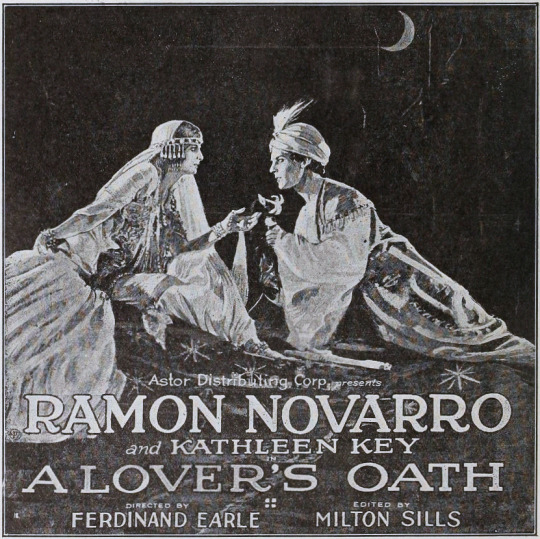
A new company, Astor Distribution Corp., was formed and purchased the distribution rights to Omar. Astor hired actor (note, not an editor) Milton Sills to re-cut the film to make Novarro and Key more prominent. The company also re-wrote the intertitles, reduced the films runtime by more than ten minutes, and renamed the film A Lover’s Oath. Earle had moved on by this point, vowing to never direct again. In fact, Earle was indirectly working with Novarro and Key again at the time, as an art director on Ben-Hur!
Despite Omar’s seemingly auspicious start in 1920, it was only released in the US on the states rights market as a cash-in on the success of one of its actors in a re-cut form five years later.
That said, A Lover’s Oath still received some good reviews from those who did manage to see it. Most of the negative criticism went to the story, intertitles, and Sills’ editing.
What kind of legacy could/should Omar have had? I’m obviously limited in my speculation by the fact that the film is lost, but there are a few key facts about the film’s production, release, and timing to consider.
The production budget was stated to be $174,735. That is equivalent to $3,246,994.83 in 2024 dollars. That is a lot of money, but since the production was years long and Omar was a period film set in a remote locale and features fantastical special effects sequences, it’s a modest budget. For contemporary perspective, Robin Hood (1922, extant) cost just under a million dollars to produce and Thief of Bagdad (1924, extant) cost over a million. For a film similarly steeped in spectacle to have nearly 1/10th of the budget is really very noteworthy. And, perhaps if the film had ever had a proper release in the US—in Earle’s intended form (that is to say, not the Sills cut)—Omar may have made as big of a splash as other epics.
It’s worth noting here however that there are a number of instances in contemporary trade and fan magazines where journalists off-handedly make this filmmaking experiment about undermining union workers. Essentially implying that that value of Earle’s method would be to continue production when unionized workers were striking. I’m sure that that would absolutely be a primary thought for studio heads, but it certainly wasn’t Earle’s motivation. Often when Earle talks about the method, he focuses on being able to film things that were previously impossible or impracticable to film. Driving down filming costs from Earle’s perspective was more about highlighting the artistry of his own specialty in lieu of other, more demanding and time-consuming approaches, like location shooting.
This divide between artists and studio decision makers is still at issue in the American film and television industry. Studio heads with billion dollar salaries constantly try to subvert unions of skilled professionals by pursuing (as yet) non-unionized labor. The technical developments of the past century have made Earle’s approach easier to implement. However, just because you don’t have to do quite as much math, or time an actor’s movements to a metronome, does not mean that filming a combination of painted/animated and live-action elements does not involve skilled labor.
VFX artists and animators are underappreciated and underpaid. In every new movie or TV show you watch there’s scads of VFX work done even in films/shows that have mundane, realistic settings. So, if you love a film or TV show, take the effort to appreciate the work of the humans who made it, even if their work was so good you didn’t notice it was done. And, if you’ve somehow read this far, and are so out of the loop about modern filmmaking, Disney’s “live-action” remakes are animated films, but they’ve just finagled ways to circumvent unions and low-key delegitimize the skilled labor of VFX artists and animators in the eyes of the viewing public. Don’t fall for it.
VFX workers in North America have a union under IATSE, but it’s still developing as a union and Marvel & Disney workers only voted to unionize in the autumn of 2023. The Animation Guild (TAG), also under the IATSE umbrella, has a longer history, but it’s been growing rapidly in the past year. A strike might be upcoming this year for TAG, so keep an eye out and remember to support striking workers and don’t cross picket lines, be they physical or digital!
Speaking of artistry over cost-cutting, I began this post with a mention that in the early 1920s, the American film industry was developing an inferiority complex in regard to its own artistry. This was in comparison to the European industries, Germany’s being the largest at the time. It’s frustrating to look back at this period and see acceptance of the opinion that American filmmakers weren’t bringing art to film. While yes, the emergent studio system was highly capitalistic and commercial, that does not mean the American industry was devoid of home-grown artists.
United Artists was formed in 1919 by Douglas Fairbanks, Charlie Chaplin, Mary Pickford, and D.W. Griffith precisely because studios were holding them back from investing in their art—within the same year that Earle began his Omar project. While salaries and unforgiving production schedules were also paramount concerns in the filmmakers going independent, a primary impetus was that production/distribution heads exhibited too much control over what the artists were trying to create.
Fairbanks was quickly expanding his repertoire in a more classical and fantastic direction. Cecil B. DeMille made his first in a long and very successful string of ancient epics. And the foreign-born children of the American film industry, Charlie Chaplin, Rex Ingram, and Nazimova, were poppin’ off! Chaplin was redefining comedic filmmaking. Ingram was redefining epics. Nazimova independently produced what is often regarded as America’s first art film, Salome (1923, extant), a film designed by Natacha Rambova, who was *gasp* American. Earle and his brother, William, had ambitious artistic visions of what could be done in the American industry and they also had to self-produce to get their work done.
Meanwhile, studio heads, instead of investing in the artists they already had contracts with, tried to poach talent from Europe with mixed success (in this period, see: Ernst Lubitsch, F.W. Murnau, Benjamin Christensen, Mauritz Stiller, Victor Sjöström, and so on). I’m in no way saying it was the wrong call to sign these artists, but all of these filmmakers, even if they found success in America, had stories of being hired to inject the style and artistry that they developed in Europe into American cinema, and then had their plans shot down or cut down to a shadow of their creative vision. Even Stiller, who tragically died before he had the opportunity to establish himself in the US, faced this on his first American film, The Temptress (1926, extant), on which he was replaced. Essentially, the studio heads’ actions were all hot air and spite for the filmmakers who’d gone independent.
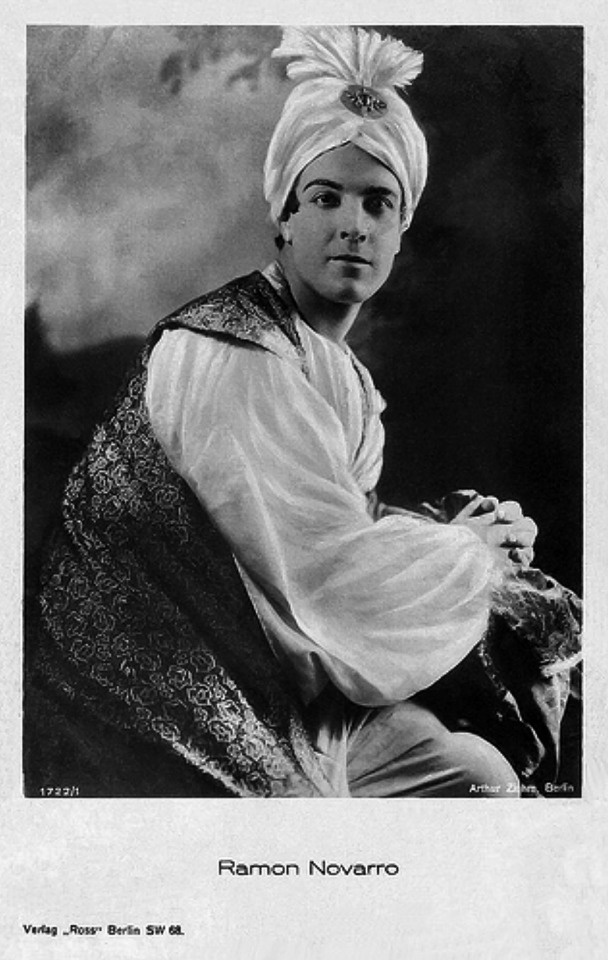
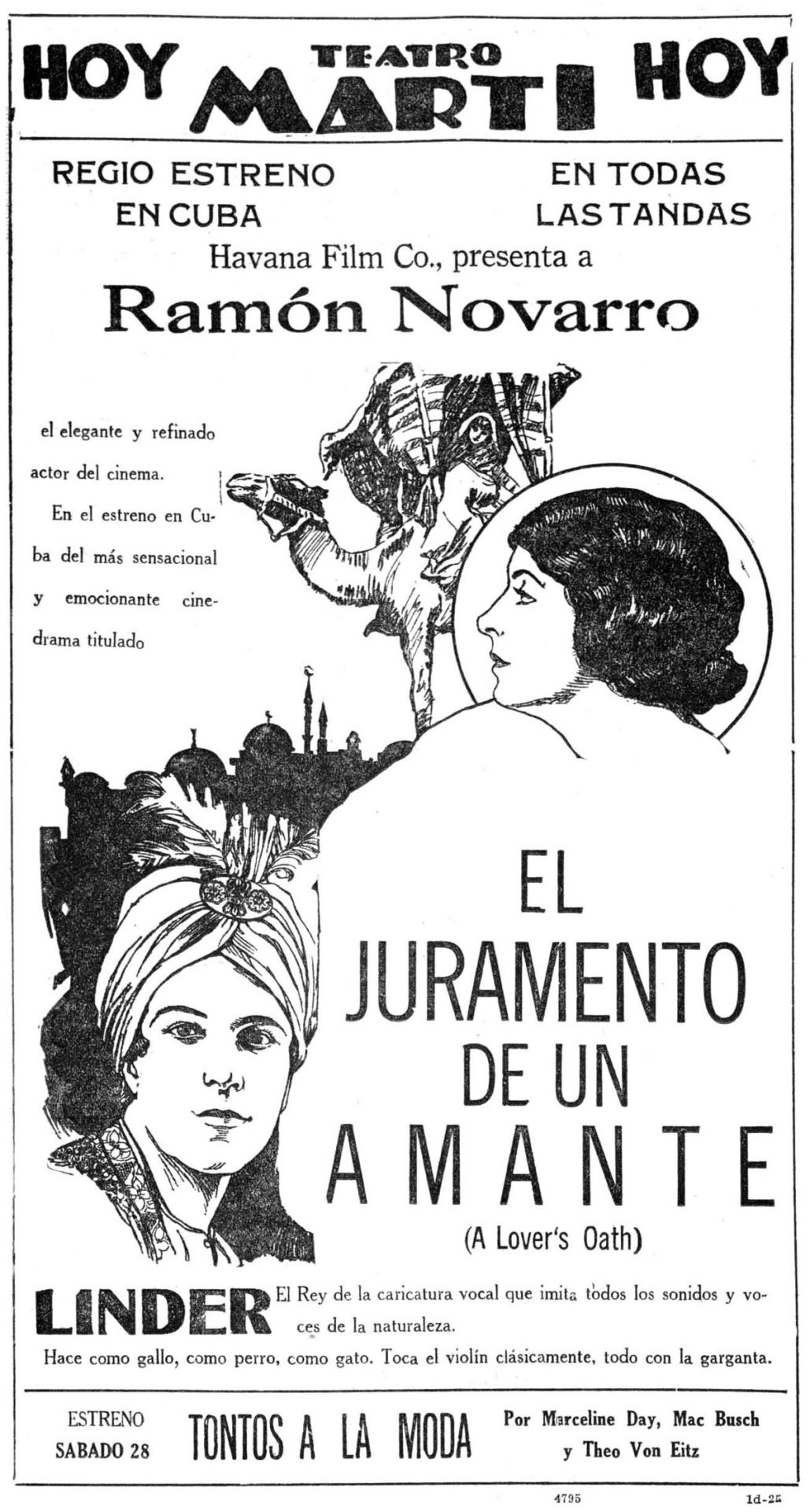
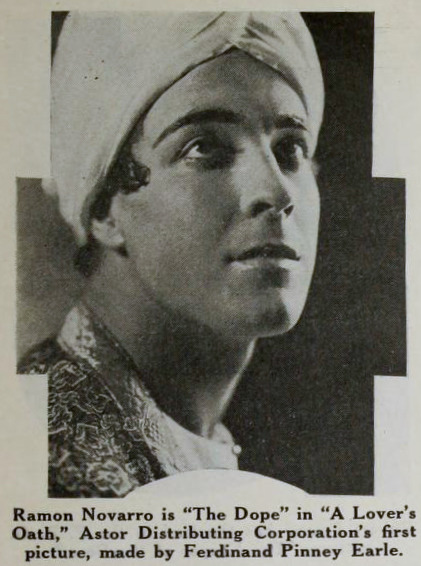
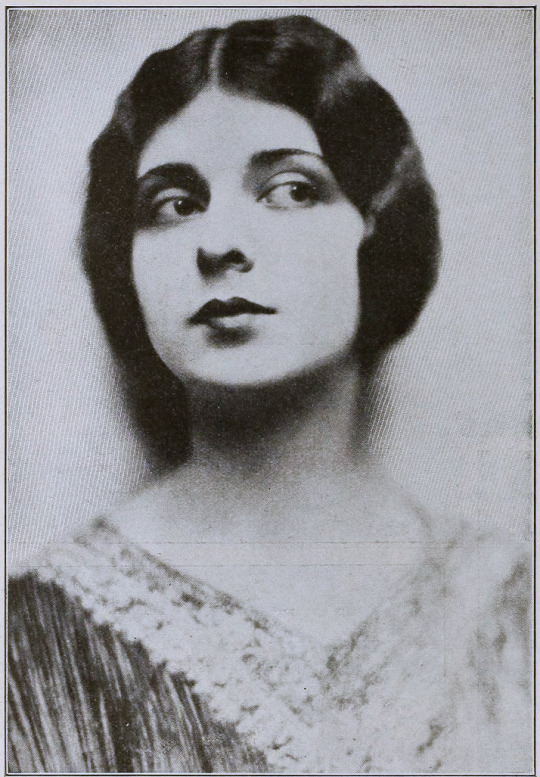
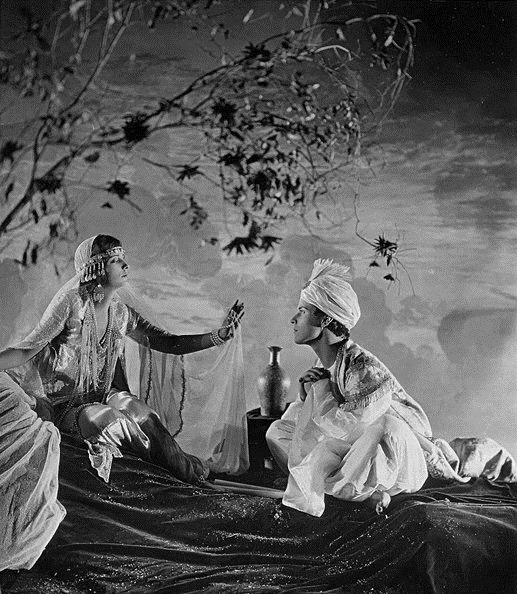
Finally I would like to highlight Ferdinand Earle’s statement to the industry, which he penned for from Camera in 14 January 1922, when his financial backers kidnapped his film to re-edit it on their terms:
MAGNA CHARTA
Until screen authors and producers obtain a charter specifying and guaranteeing their privileges and rights, the great slaughter of unprotected motion picture dramas will go merrily on.
Some of us who are half artists and half fighters and who are ready to expend ninety per cent of our energy in order to win the freedom to devote the remaining ten per cent to creative work on the screen, manage to bring to birth a piteous, half-starved art progeny.
The creative artist today labors without the stimulus of a public eager for his product, labors without the artistic momentum that fires the artist’s imagination and spurs his efforts as in any great art era.
Nowadays the taint of commercialism infects the seven arts, and the art pioneer meets with constant petty worries and handicaps.
Only once in a blue moon, in this matter-of-fact, dollar-wise age can the believer in better pictures hope to participate in a truely [sic] artistic treat.
In the seven years I have devoted to the screen, I have witnessed many splendid photodramas ruined by intruding upstarts and stubborn imbeciles. And I determined not to launch the production of my Opus No. 1 until I had adequately protected myself against all the usual evils of the way, especially as I was to make an entirely new type of picture.
In order that my film verison [sic] of the Rubaiyat of Omar Khayyam might be produced under ideal conditions and safeguarded from intolerable interferences and outside worries, I entered into a contract with the Rubaiyat, Inc., that made me not only president of the corporation and on the board of directors, but which set forth that I was to be author, production manager, director, cutter and film editor as well as art director, and that no charge could be made against the production without my written consent, and that my word was to be final on all matters of production. The late George Loane Tucker helped my attorney word the contract, which read like a splendid document.
Alas, I am now told that only by keeping title to a production until it is declared by yourself to be completed is it safe for a scenario writer, an actor or a director, who is supposedly making his own productions, to contract with a corporation; otherwise he is merely the servant of that corporation, subject at any moment to discharge, with the dubious redress of a suit for damages that can with difficulty be estimated and proven.
Can there be any hope of better pictures as long as contracts and copyrights are no protection against financial brigands and bullies?
We have scarcely emerged from barbarism, for contracts, solemnly drawn up between human beings, in which the purposes are set forth in the King’s plainest English, serve only as hurdles over which justice-mocking financiers and their nimble attorneys travel with impunity, riding rough shod over the author or artist who cannot support a legal army to defend his rights. The phrase is passed about that no contract is invioliable [sic]—and yet we think we have reached a state of civilization!
The suit begun by my attorneys in the federal courts to prevent the present hashed and incomplete version of my story from being released and exhibited, may be of interest to screen writers. For the whole struggle revolves not in the slightest degree around the sanctity of the contract, but centers around the federal copyright of my story which I never transferred in writing otherwise, and which is being brazenly ignored.
Imagine my production without pictorial titles: and imagine “The Rubaiyat” with a spoken title as follows, “That bird is getting to talk too much!”—beside some of the immortal quatrains of Fitzgerald!
One weapon, fortunately, remains for the militant art creator, when all is gone save his dignity and his sense of humor; and that is the rapier blade of ridicule, that can send lumbering to his retreat the most brutal and elephant-hided lord of finance.
How edifying—the tableau of the man of millions playing legal pranks upon men such as Charles Wakefield Cadman, Edward S. Curtis and myself and others who were associated in the bloody venture of picturizing the Rubaiyat! It has been gratifying to find the press of the whole country ready to champion the artist’s cause.
When the artist forges his plowshare into a sword, so to speak, he does not always put up a mean fight.
What publisher would dare to rewrite a sonnet of John Keats or alter one chord of a Chopin ballade?
Creative art of a high order will become possible on the screen only when the rights of established, independent screen producers, such as Rex Ingram and Maurice Tourneur, are no longer interferred with and their work no longer mutilated or changed or added to by vandal hands. And art dramas, conceived and executed by masters of screen craft, cannot be turned out like sausages made by factory hands. A flavor of individuality and distinction of style cannot be preserved in machine-made melodramas—a drama that is passed from hand to hand and concocted by patchworkers and tinkerers.
A thousand times no! For it will always be cousin to the sausage, and be like all other—sausages.
The scenes of a master’s drama may have a subtle pictorial continuity and a power of suggestion quite like a melody that is lost when just one note is changed. And the public is the only test of what is eternally true or false. What right have two or three people to deprive millions of art lovers of enjoying an artist’s creation as it emerged from his workshop?
“The Rubaiyat” was my first picture and produced in spite of continual and infernal interferences. It has taught me several sad lessons, which I have endeavored in the above paragraphs to pass on to some of my fellow sufferers. It is the hope that I am fighting, to a certain extent, their battle that has given me the courage to continue, and that has prompted me to write this article. May such hubbubs eventually teach or inforce a decent regard for the rights of authors and directors and tend to make the existence of screen artisans more secure and soothing to the nerves.
FERDINAND EARLE.
---
☕Appreciate my work? Buy me a coffee! ☕
Transcribed Sources & Annotations over on the WMM Blog!
See the Timeline for Ferdinand P. Earle's Rubaiyat Adaptation
#1920s#1923#1925#omar khayyam#ferdinand pinney earle#ramon novarro#independent film#american film#silent cinema#silent era#silent film#classic cinema#classic movies#classic film#film history#history#Charles Wakefield Cadman#cinematography#The Rubaiyat#cinema#film#lost film
51 notes
·
View notes
Text

This. THIS.
I can confirm as a comic, film and theatre fan who loves the MCU that no! The MCU is NOT "destroying cinema" nor is it turning the US into some "cultural wasteland!"
If you truly care about cinema and culture, go to your local cinema showing films you care about like little known films, art-house indies and classics; support your local theatre-scene, donate to art programs, attend a live performance. But most of all: Tell your friends about your experiences, recommend them things. Please, just please stop treating Marvel Studios like the Umbrella Corporation and Kevin Feige as Albert Wesker.
The MCU can co-exist with independent films just as it can with Bernstein, Gershwin and Rogers and Hammerstein. One does not cancel out the other.
And to any comic purists, Kevin Feige DOES understand what he's working with, he DOES care about comics. And no, we are not living in a "dark age of superhero movies!" You want a real dark age of superhero movies? Try the years 1997-2010. Believe me, I was there. "But what about Spider-man 1 and 2, Batman Begins, The Dark Knight Returns and some others?" They worked because they were the EXCEPTION, not the rule.
#mcu#marvel cinematic universe#marvel#films#theatre#musical theatre#art and culture#art#culture#we are not living in a dark age of superhero movies
10 notes
·
View notes
Text

So, Ginger Rogers as Alice wasn't something I'd considered.
youtube
Adults as Alice is always a tricky proposition. Ginger Rogers does quite a good job in this recording from 1944. And the White Rabbit sounds quite a bit like Elmer Fudd, so it may be Arthur Q. Bryan.
The photo may be from a test for a proposed version of Alice to star Ginger Rogers and to have been produced in 1945. That did not come to pass, sadly.
A film Alice that did get produced starred 19-year-old Charlotte Henry. Done at Paramount in 1933 and incorporating elements of both Alice in Wonderland and Through the Looking Glass, the film featured such top-line players as Cary Grant (Mock Turtle), Edward Everett Horton (Mad Hatter), W.C. Fields (Humpty Dumpty), and Gary Cooper (White Knight) alongside Henry. It was not a success, however, either at the box office or with critics.

Henry's career was not helped by the film's poor showing, although she did appear in a few more major-studio productions before slipping down to Poverty Row studios such as Monogram and Republic and leaving films in 1942.
From there, well, there's some question as to where life took her. One source says, "After retiring from motion pictures in 1942, she moved to San Diego to run an employment agency with her mother and worked for fifteen years as an executive secretary for Charles F. Buddy, the Roman Catholic Bishop of San Diego." Another says that her path took her to burlesque, specifically, the Hollywood Theatre Company in San Diego:

Both could, conceivably, be true. Which would've marked quite a career trajectory for Ms. Henry.
#ginger rogers#charlotte henry#alice in wonderland#film adaptations#paramount studios#decca records#burlesque#1933#1944#Youtube
9 notes
·
View notes